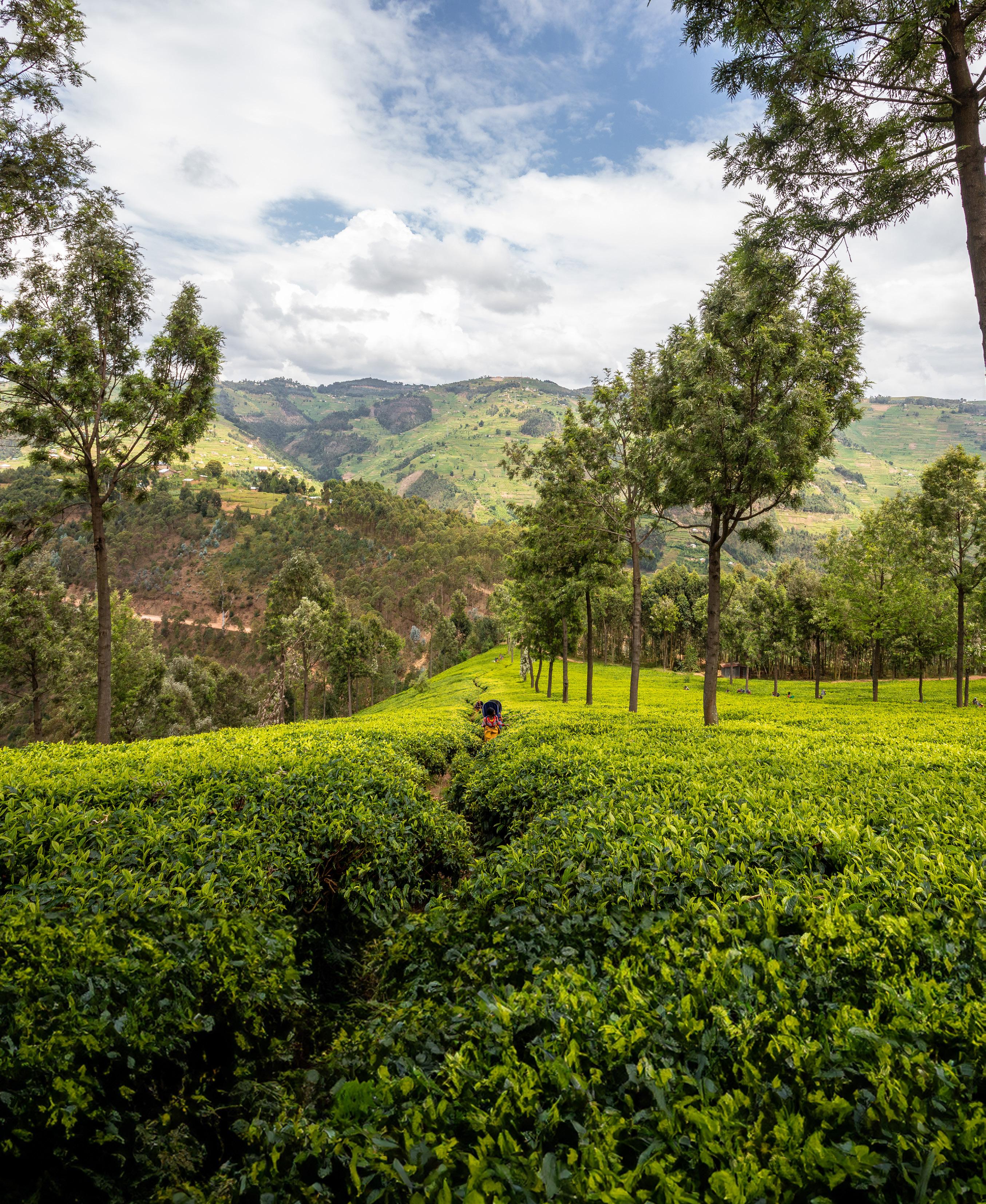
2023
Sustainability Report
In 2023 we took home two major sustainability awards and achieved B Corp certification across all three branches of our business. Behind the headlines, a multitude of details bring our sustainability vision to life. In the spirit of transparency, it is an honor to share our third Sustainability Report with you.
This report details how sustainability shapes our entire organization. We take our inspiration from the ayurvedic practices that guide our recipes because sustainability, like ayurveda, seeks balance.
An unsustainable world creates imbalances on farms, in homes, and in our spirits. Ayurvedic practices create balance for individuals just as the work outlined in this report is bringing our company into balance with the world that sustains us.
From the creative minds of research and development to the systemsthinkers behind logistics; from thoughtful sourcing to mindful retail, it takes a diverse, conscientious community to make sustainability real.
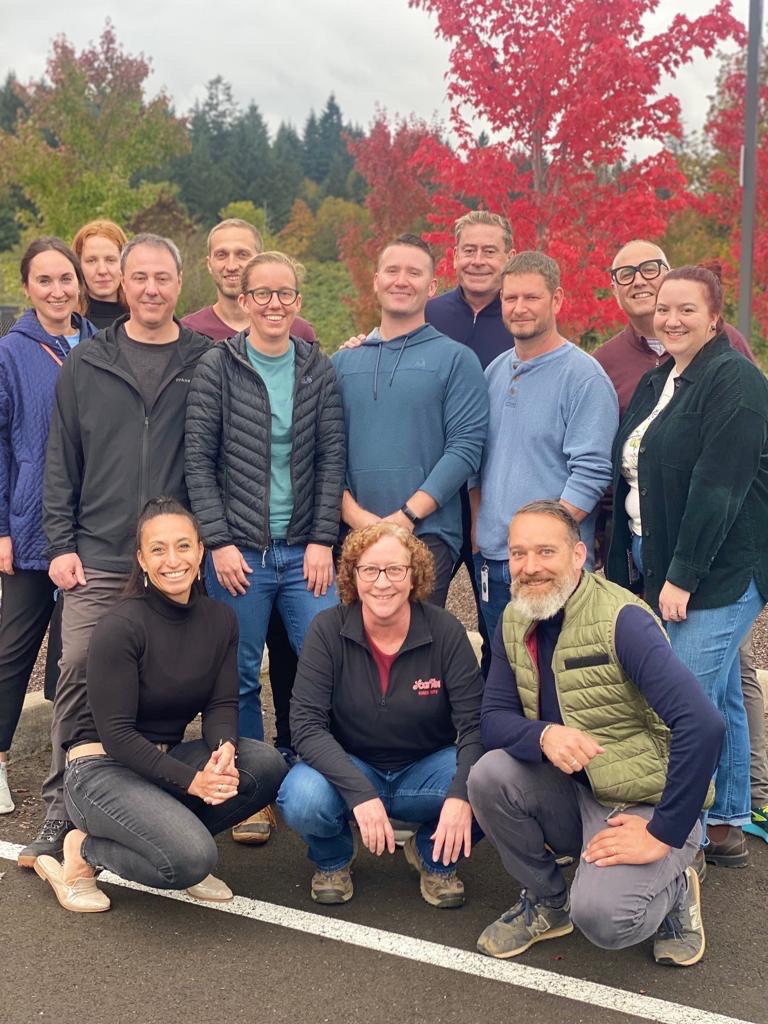
Our supplier partners are evolving from organic to regenerative organic. Our packaging is under constant scrutiny so that someday it can be completely reused, recycled, or composted. Our facilities are striving to balance inputs with outputs. Our retailers are adding their voices as we work together to create a harmonious future.
You are an important part of this too. You reach for our teas to find balance in your lives: when your mind is restless, our blends can put you at ease. When energy levels dip, an energizing cup of tea can help. When you’re anxious or overwhelmed, tea offers comfort and peace.
As our teas bring balance to you, we’re working hard so the teas themselves bring balance to the world that creates them.
As ayurveda teaches, what happens to the world impacts the individual and what happens to the individual impacts the world. The work of balance impacts all of us, takes all of us, and allows us all to flourish. Thank you for joining us on this journey. We hope you feel inspired by what follows.
Your Yogi Sustainability Team
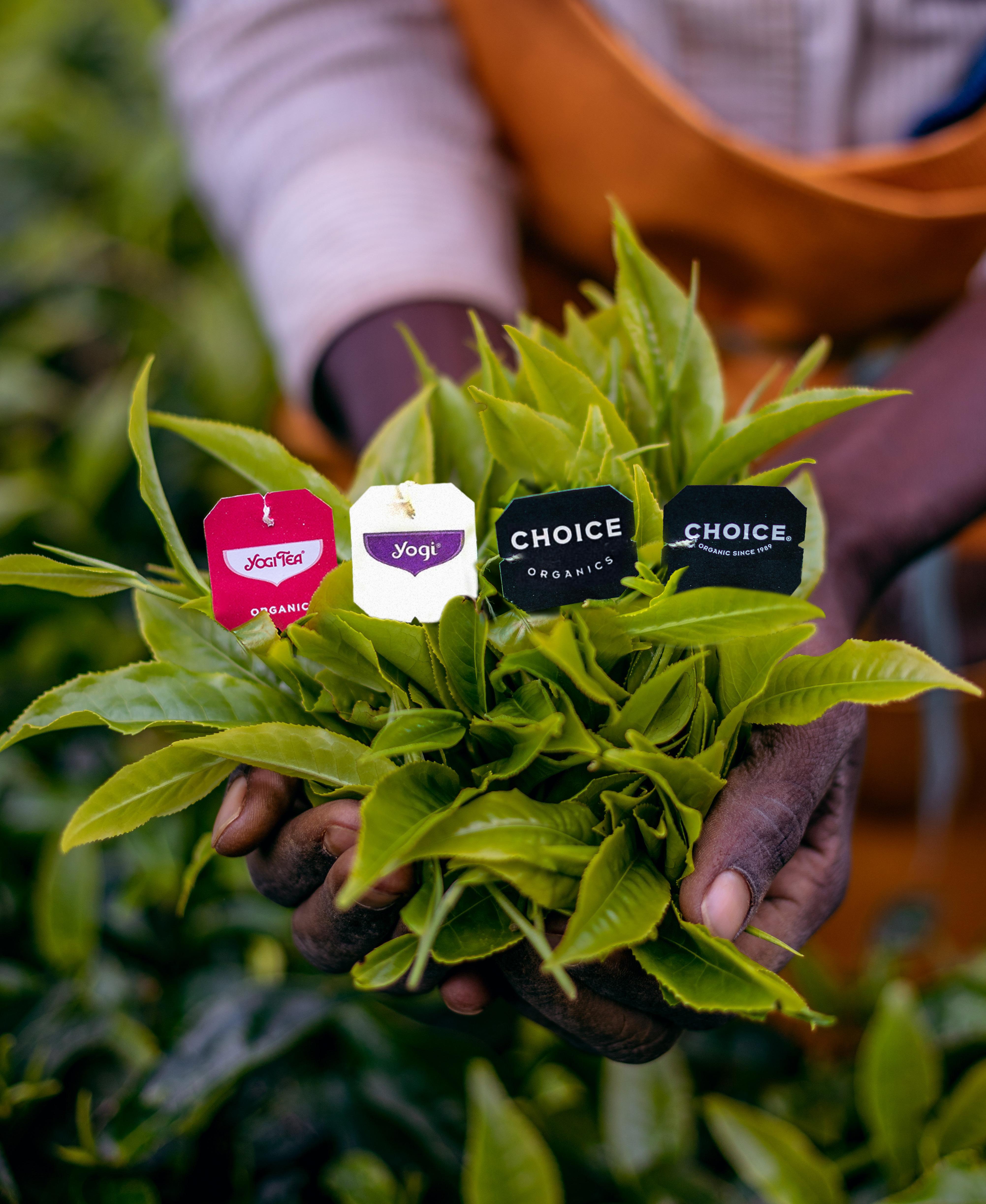
From our hands to your hearts: Our sustainability story Join us as we share our teas’ journey, from ideation to appreciation, highlighting how sustainability guides everything we do.
Inspiration in motion 8 - 13 Research and development 54 - 61 Closing the loop The Yogi Foundation 28 - 37 Where Yogi and Choice become real Facilities 14 - 21 Ingredients with purpose Sourcing Logistics 22 - 27 Connecting farms to teacups 38 - 43 Care for every detail Packaging 44 - 53 Celebrating our community Sales 5
3,000,000kgs organic ingredients purchased
140+ unique ingredients
50+ source countries
92% ingredients traceable to co-op or farm level
6 farm collaborations to promote sustainable change
10 projects implementing regenerative agricultural practices
12 Yogi Foundation grants awarded
288,279.46 dollars donated through Yogi Foundation
5 carbon Working Groups formed
18 carbon reduction projects completed
6
2023 AT A GLANCE
Reduce, regenerate, and flourish – our sustainability strategy in action
117,087kg of packaging material saved globally
100.2 metric tons CO2e saved through packaging innovation in North America
129.3
Eugene Headquarters’ B Corp Score
108.5 TeaPak’s B Corp Score
117.6 Yogi Hamburg’s B Corp Score
2 facilities waste upcycling initiatives launched
2,437.1 miles Eugene employees biked to work
7

Research and development
Inspiration in motion
Research and development
8

It all begins with inspiration. A delicious new flavor combination, or an exciting new ingredient, or a need to provide tea drinkers with energy, relaxation, or immune support – whatever the source, our Marketing and R&D teams in Hamburg and Eugene are the creative engine rooms that keep Yogi current, inspiring, and delicious, with sustainability always in mind.
The R&D department is where sharp minds, curious spirits, and sensitive palates create the best-tasting teas around, bringing excitement to tea shelves globally.

9
Our research and development process
1. Concept
Our teas are made with you in mind. We begin with identifying what our tea drinkers need and why: are people feeling stressed? Maybe a relaxing blend will help. Or perhaps sourcing found an exciting new ingredient that works as a digestion aid, so we want to craft a tea around that. Providing ayurvedic benefits for our community motivates much of our work.
2. Focus testing
We might have an idea of what we want our new tea to be, but we need consensus. We encourage diverse feedback to make sure our concepts resonate, provide value, and taste great, to tea drinkers around the world.

3. Sourcing exploration
With a concept identified and interest established, it’s time to make sure the ingredients we’ve selected can be sourced reliably, and up to our quality standards. If we can’t source an ingredient properly, meeting both our quality criteria and our sustainability standards, we won’t use it. Check out the sourcing section (page 14) for details.
10
Research and development
4. Recipe development
Now we have a concept, and we know we can get the key ingredients. We then develop a variety of blends: one with more citrus, one with more spice, one more intense and one more mild. Then it’s time to taste, adjust, taste, adjust, taste, and taste again – until we get a couple versions we’re pleased with.
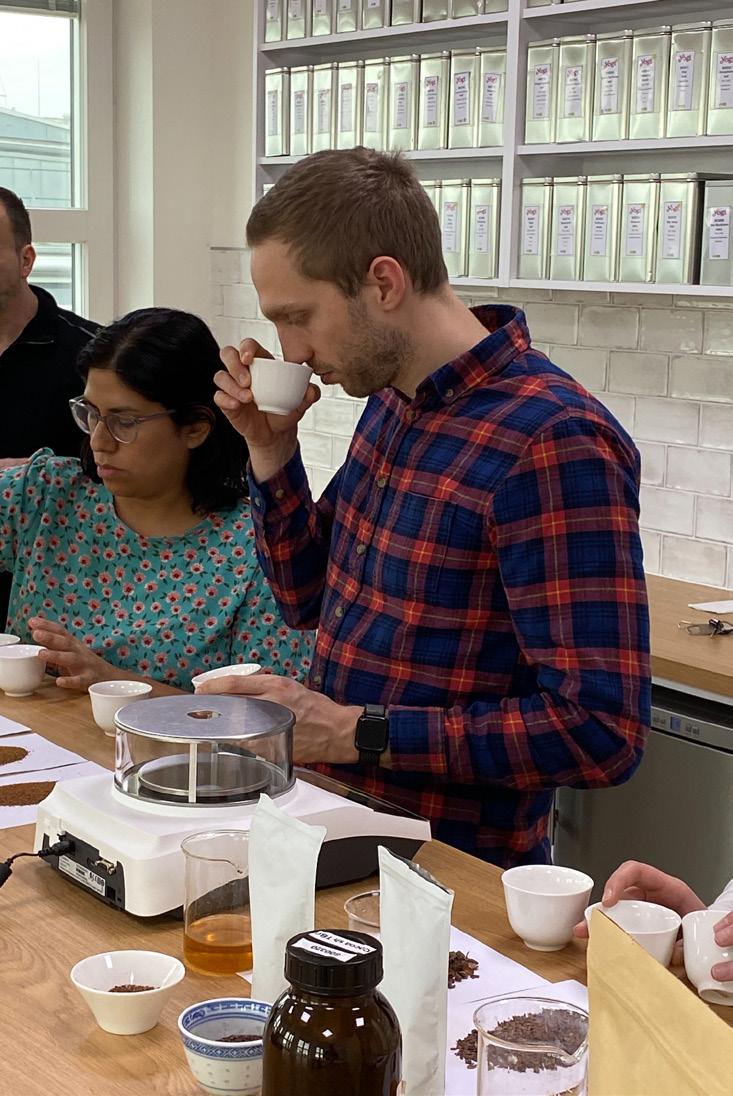
7. Final checks
With final signoffs from sourcing, quality, marketing, and manufacturing, we’re finally ready to turn the tea over to sales to bring it to you. And now, with their new tea en route to a shelf near you, R&D can head back out into the world and to the drawing board to see what comes next!
5. Contributor testing
With a couple winning recipes in hand, it’s time to share our ideas with you. We trust our tea drinkers’ judgment to decide which of our prototypes makes it to the next stage – we call our drinkers “contributors” because of their integral role in shaping our teas!
6. Factory testing
Our community has spoken, and we finally have a winning recipe: it has a well-defined identity, we know we can source its ingredients responsibly, we’re excited about it, and now it’s time to think about how making this tea will look in our two production facilities. We’ll make some small batches of the new recipe and make sure the ingredients work well with our machinery. We want to avoid any waste – it’s costly, inefficient, and a disservice to the people and places who grow our ingredients.

11
Our North Star: Ayurveda
We aren’t called Yogi for nothing! Our functional teas are shaped by ancient traditions, including traditional Chinese medicine, Native American herbology, and especially ayurveda, a holistic well-being practice where food is medicine, bringing living things into balance with the world around them.
What is Ayurveda?
Originating in India over 5,000 years ago, ayurveda is one of the oldest systems of whole-body healing in the world It combines practices like yoga, meditation, and mindful food consumption to keep people healthy and treat the sick. The word translates to “life science” or “science of life.”
Ayurveda seeks to balance your current state – Vikriti – with your basic constitution, or Prakriti. Eating certain foods, especially herbs and spices, can help bring the self into balance.
Sustainability and Ayurveda
Today’s world is out of balance because businesses and societies are taking more than they’re giving. The work of sustainability is the work of balance, bringing human activity into harmony with the natural world. Ayurveda isn’t just our inspiration for product creation –it’s our way of life. In the same way we hope our teas bring your organism into balance, we use sustainability to bring our operations into equilibrium with the world around us.
Throughout this report, you’ll read stories about how we’re working hard to bring our company in balance: by consuming less, reusing more, and giving back. In R&D, our teas are made to bring balance to your life, but they can only do that if they are made with balance in mind. To that end, R&D is constantly communicating with sourcing, packaging, and manufacturing, making sure that our new ideas can be sustainable all the way through.
Every living creature has a particular combination of doshas that form their basic constitution.
Vata: The vata dosha is all about movement, combining ether and air to facilitate communication inside and outside the body Pitta: This dosha is all about heat, metabolism, digestion, and other processes of transformation.
Kapha: A union of Earth and water, kapha is the principle of stability and slowness.
Foods’ flavors, or “rasa,” have doshas too, and they impact your dosha when they’re consumed. Balancing flavors is how we create the functional benefits for our teas. If we want a tea to give you a pick-me-up, we’ll look for ingredients to increase pitta and vata. If it’s time for bed, kapha comes to the fore.

R&D at Yogi sets the tone for everything that follows. We are deliberate and mindful about sustainability throughout the entire R&D process, making sure we develop recipes we can ethically support through our entire organization. In the end, it all comes back to ayurveda: bringing balance to people through balanced teas.
The next stop on our tea journey is sourcing, where we make sure every ingredient that we use is doing its part.
12
Research and development
TASTE ELEMENTS
Sweet (madhura)
Sour (amla)
Salty (lavana)
Pungent (katu)
Bitter (tikta)
Astringent (kashaya)
SOURCE VÀTA PITTA KAPHA
Honey, rice, sugar, nuts, fruits, carbohydrates, grains, natural sugar, milk
Yoghurt, citrus fruits, ascorbic acid, vitamin C, vinegar, cheese, fermented foods
Seaweed, tamari, table salt, sea salt, sea vegetables
Cayenne, chile pepper, black pepper, ginger, garlic, herbs and spices
Turmeric, dark leafy greens, herbs and spices
Alliums, green banana, legumes, raw fruits and vegetables, herbs
earth water fire air ether
13

Ingredients with purpose Sourcing
Sourcing
14
The first sustainability check for any new tea is the sourcing department. Mindful of global trends and local challenges, our sourcing team is constantly striving to support the global Yogi community.
With excitement building around a new recipe, it’s time to find out where and how any new ingredients are grown, and if the available sources meet our standards.
We start in our local area. With carbon footprints in mind, sourcing locally – close to our facilities in the US or Europe – is always a best practice. When we venture farther afield, however, sustainability comes to the forefront in different ways.
We’re mindful of the political climate and social landscape when evaluating a source country. If inequitable working conditions are prevalent, we then require a social certification, like Rainforest Alliance or Fairtrade, to ensure the supplier is up to our standards.
We seek out exemplary suppliers, who set themselves up to do things sustainably from the start. Then we may have found a long-term partner, with whom we can collaborate to raise the standards of the entire region. From Guatemala to Sri Lanka, South Africa to Nepal, you can find communities touched by our sourcing around the world.
The suppliers with whom we forge long term commitments are the foundation of our sourcing goals. Long-term commitments mean being engaged: providing support for sustainability projects, working out a long-term vision, and growing together – literally and figuratively.
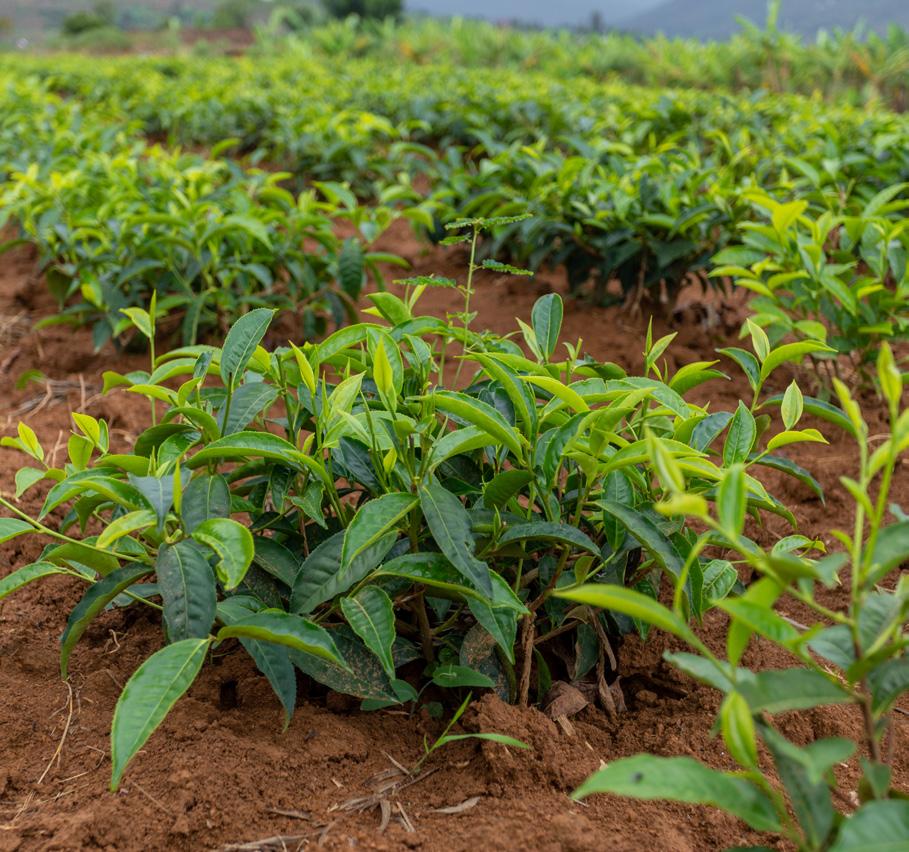
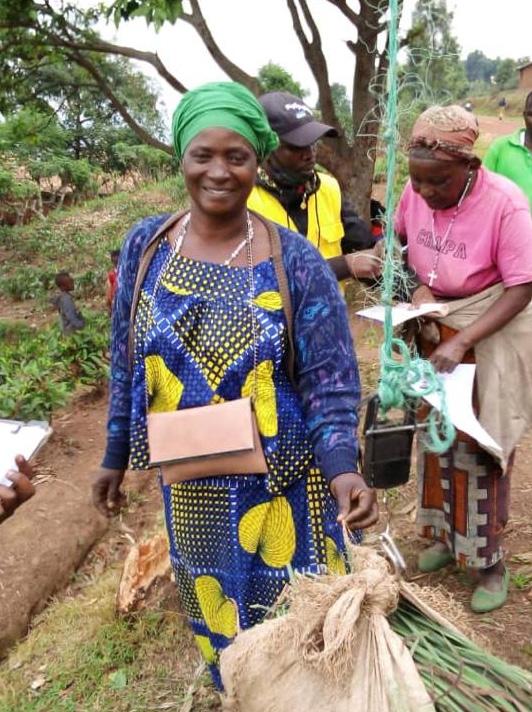
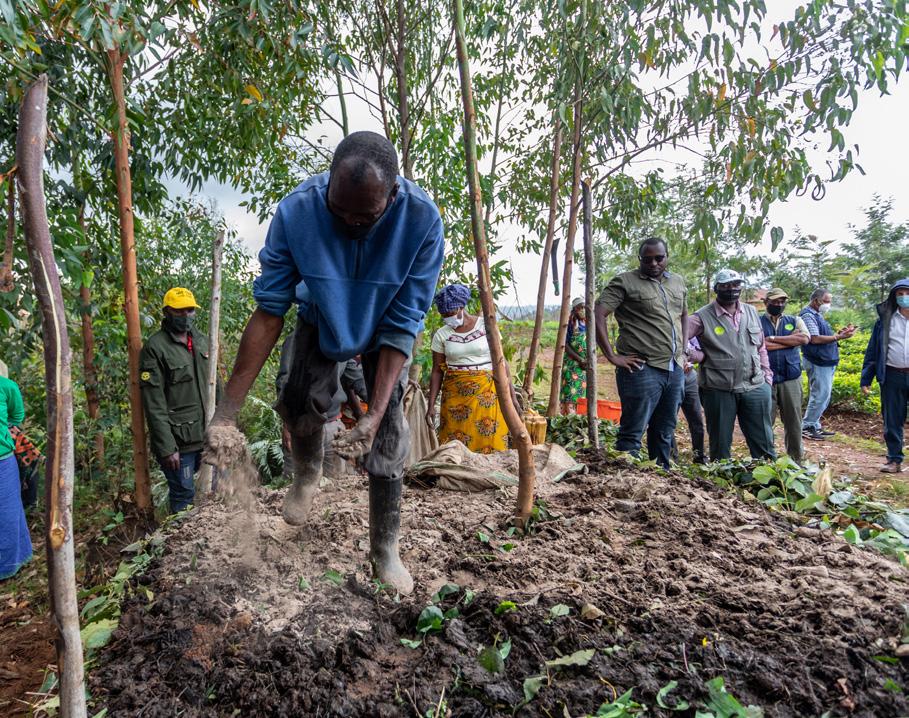
15
Our sourcing goals
Purchasing directly from the source
It’s standard practice in many industries, including tea, to purchase ingredients from middlemen. These are companies who liaise with multiple farms, aggregate their ingredients, and sell them on to producers like us. Some middlemen are excellent partners, with standards every bit as scrupulous as our own. Often, however, we prefer to go directly to the source and buy directly from the farms themselves. Through direct supplier contact we can plan collaborations, assist with farming challenges, and be more supportive than when we’re once or twice removed from the source.

Buying under long term agreement
Long term agreements are commitments between us and our supplier ensuring we’ll continue to buy their wares for an extended period. They’re crucial to our shared success! Farming is a slow-paced endeavor, and having these agreements creates space for meaningful change.

16
0 20 40 60 80 100 1 % 18 % 31 % 41 % 2023 2022 2021 2020
0 20 40 60 80 100 9 % 12 % 32 % 50 % 2023 2022 2021 2020 Sourcing
Ensuring traceability
Transparency means that we know precisely where an ingredient comes from. This might sound simple, or even easy, but the tea world isn’t set up to facilitate this kind of insight. It’s important for us to know, however, so we can stay engaged from crop to cup.

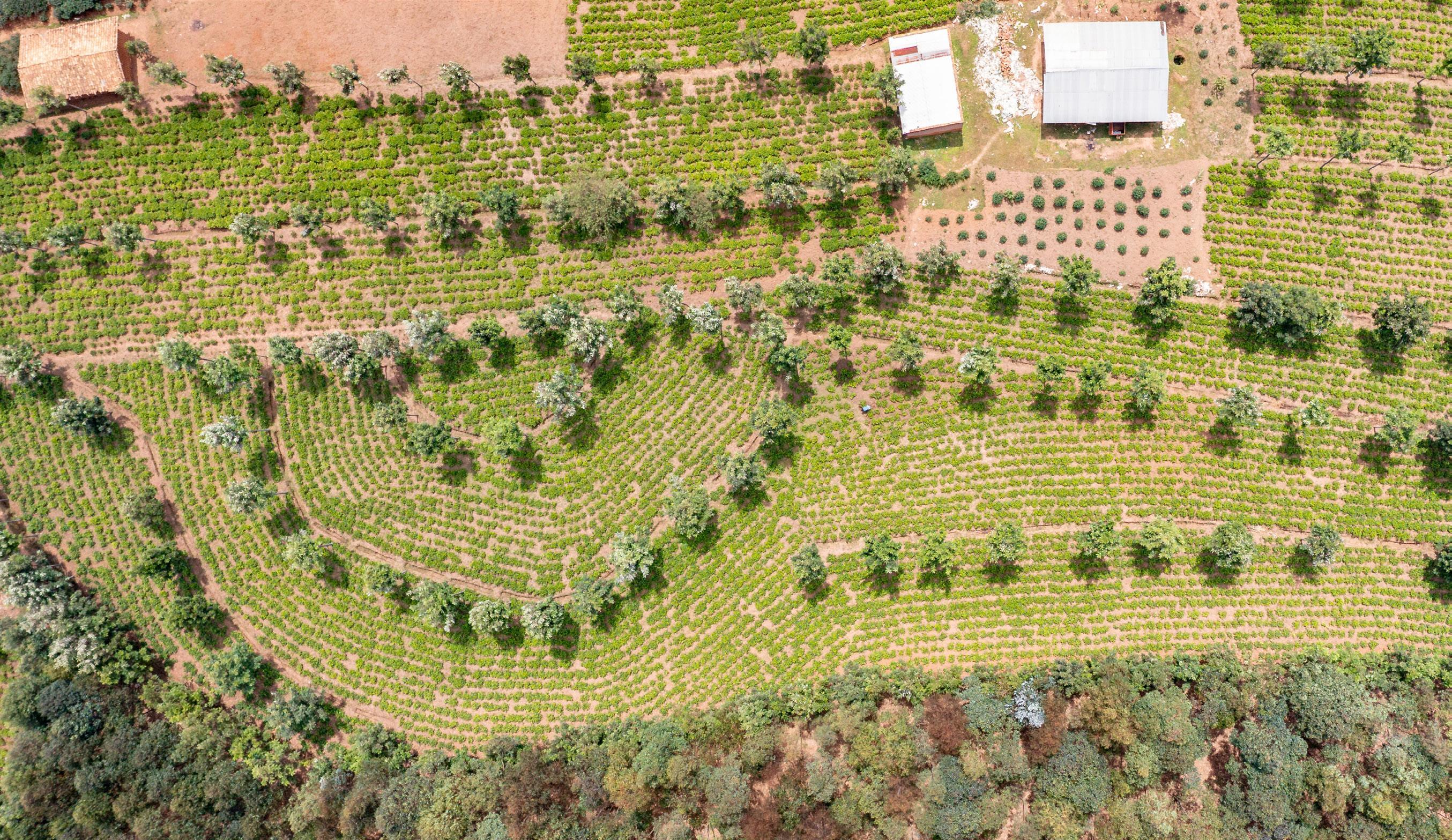
17
0 20 40 60 80 100 10 % 12 % 89 % 92 % 2023 2022 2021 2020

Suppliers in the spotlight: farms and farmers we’re honored to know
Sourcing 18
Klip op Mekaar: Extraordinary rooibos from South Africa
High in the Northern Cederberg mountains, Klip op Mekaar is one of the largest organic certified rooibos farms in the world. They pioneered regenerative agricultural practices for this famous South African specialty by avoiding tillage, rotating crops, and cover cropping, to keep their soil in peak condition.
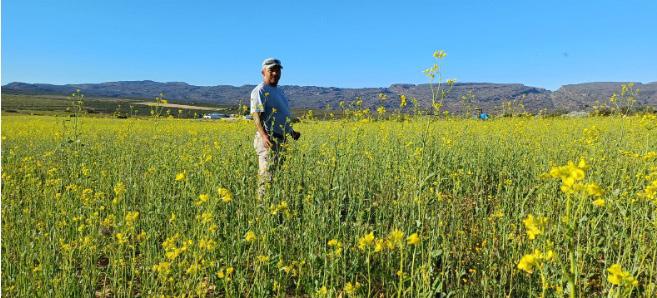
Freshly planted rooibos has a high mortality rate; it’s a delicate crop, and the region’s climate can be unforgiving. To give the crop the best possible chance at flourishing, Klip op Mekaar looked to soil health to help.
Our support enabled the research and development of innovative farming techniques to support rooibos plants early in their lives. Now, new rooibos seedlings are inoculated with a naturally occurring rhizobium that helps them get a strong start. Plus, Klip op Mekaar has started brewing a rich “tea” from compost that they produce on-site. The long-term goal is to improve soil biology – creating diverse micro-environments that support flourishing rooibos without need for fertilizers.
Diligent measuring has shown that all key performance indicators are moving in the right ways. Soil carbon is increasing, fungal biomass is growing, the rooibos plants’ root systems are stronger and healthier - all confirming that the farm is moving in a sustainable direction.
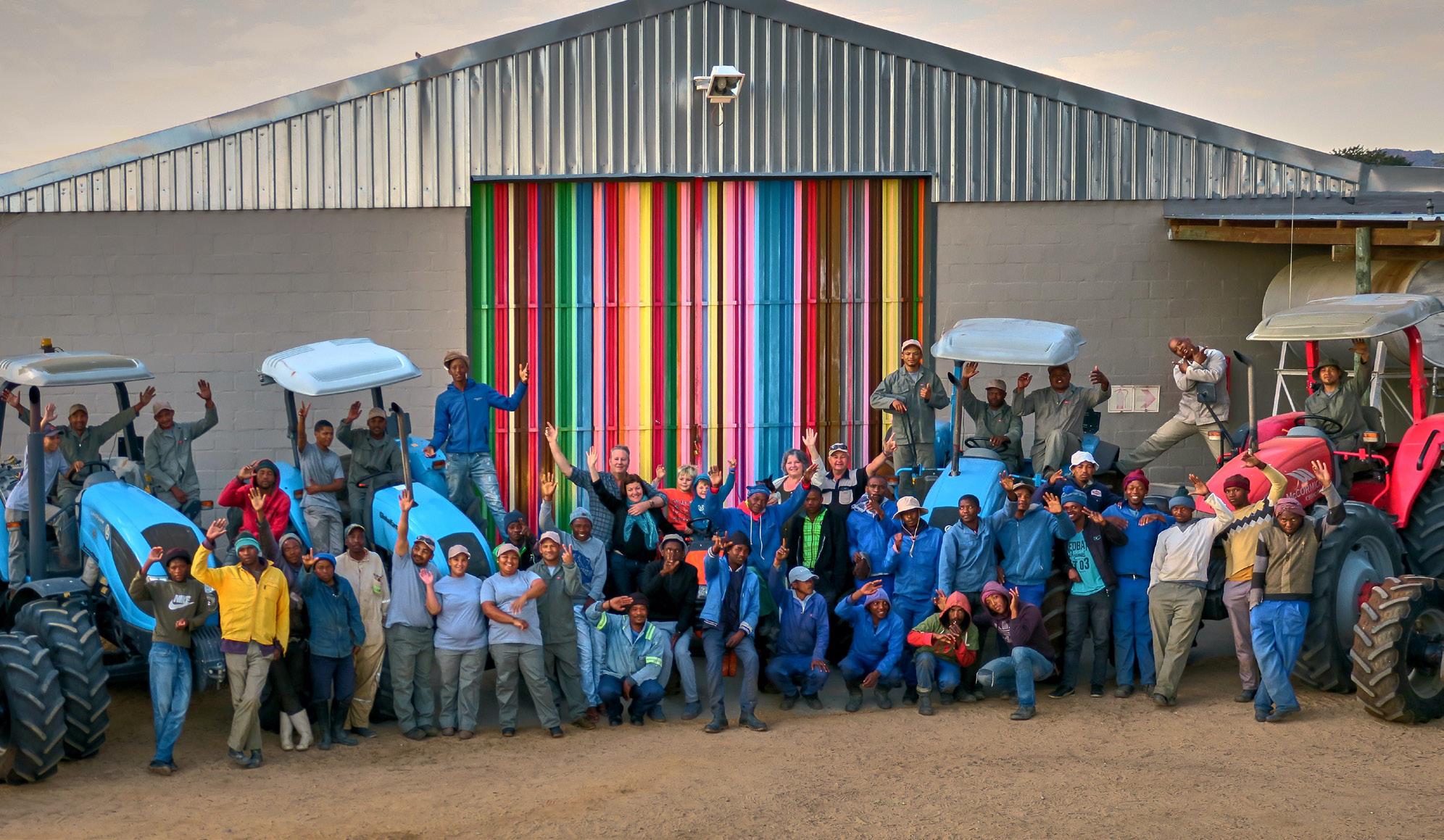
19
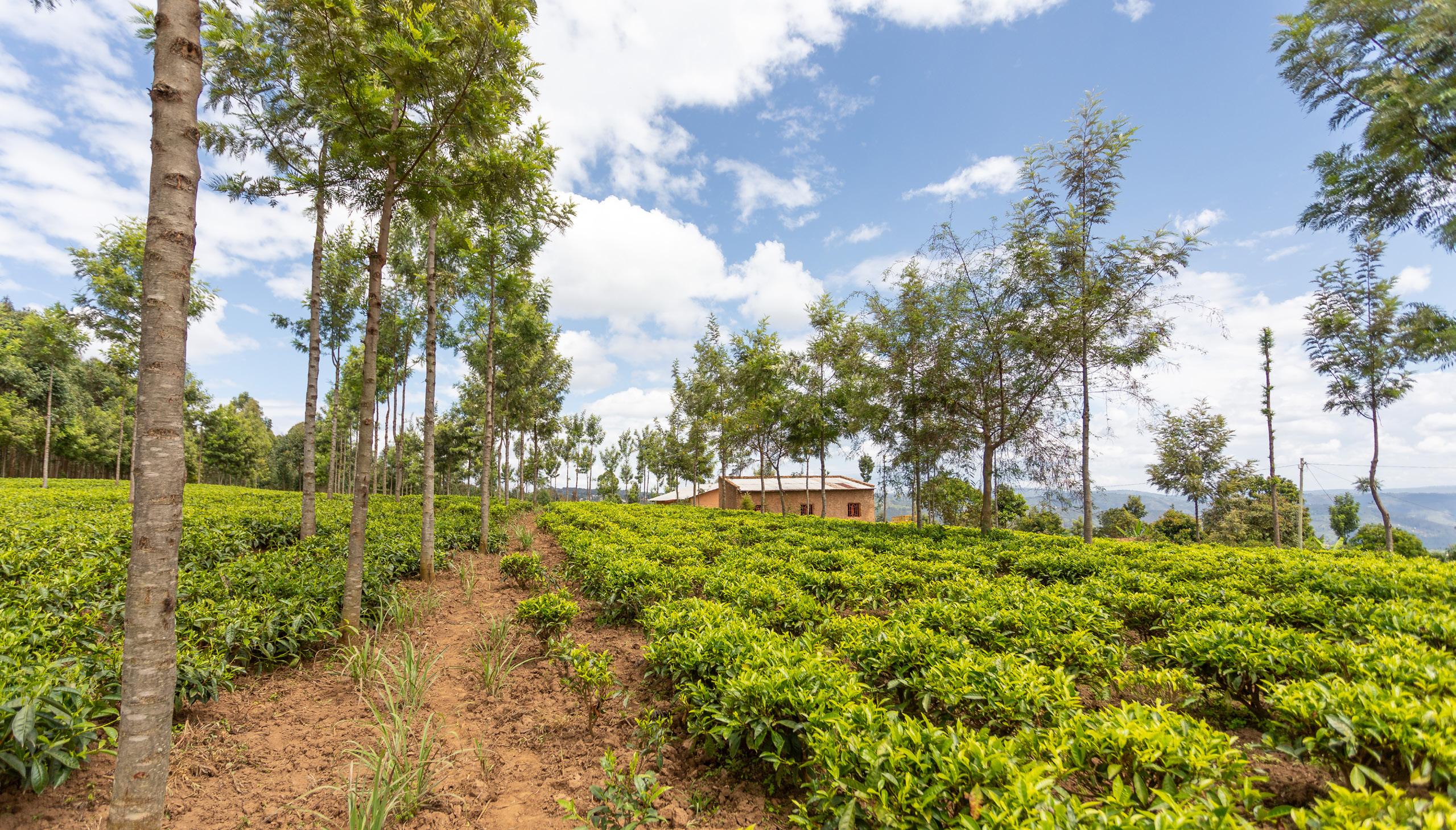
Sorwathe: Collaboration for regeneration
Rwandan tea experts Sorwathe are exemplars of conscientious, responsible, ethical partnership, going above and beyond with and without our support. We’re honored that our regenerative agricultural collaboration won the Gold Sustainability Award at the North American Tea Expo in 2023.
Our work together goes way back. In April of 2018 Sorwathe started an initiative to provide farmers’ children with a nutritionally fortified porridge called Aheza to support both early childhood development and performance in school. Yogi funding now supports critical early life nutrition for 1,000 Rwandan children every day, matching the 1,000 already sponsored by Sorwathe.
On the farm, we partnered with Sorwathe and Practical Action to launch a regenerative agricultural project: planting lemongrass among their tea bushes. Our goals include protecting topsoil, replenishing nutrient levels, and offering an additional income source for farmers to help insulate them from fluctuations in the tea market.
This project could have been a risky endeavor for farmers without a market for their new lemongrass crop. But we found a solution in-house: Our Choice Organics brand already buys their organic black tea, so we pledged that Yogi would purchase their lemongrass. We celebrated our first harvest in August of 2022.
In 2023, we secured funding from the Yogi Foundation to purchase and integrate cows for Sorwathe farmers. Cows are invaluable farming companions, a big help to long-term farming success. We purchased and donated 25 pregnant cows – the beginnings of a sustainable herd that will contribute extra income in the form of dairy, as well as natural fertilizer to support tea and lemongrass alike.
Sourcing 20
Nelixia: Cardamom with a difference
Historically, cardamom had an outsized impact on our carbon footprint. But, alongside suppliers like Nelixia, we’re supporting positive change.
Nelixia counts “Know the Source” and “Involve and Respect” as two key points in their sustainability mission. To them, farmers are vital, cherished partners in cardamom cultivation. Nelixia locates their offices close by, visits farmers frequently, and facilitates long-term contracts, which help build trust and foster lasting commitments to mutual growth.
Farmers are provided more than 40 different trainings on everything from soil conservation to safety at work. 100 hectares of agricultural land are set to be reforested through their Restore Together program, in addition to 170 ha that are already under organic agroforestry systems.
Nelixia understands that farmers are more than the product they produce. Rather than a one-size-fits-all sustainability plan, Nelixia crafts individual action plans that match the needs of each link on the value chain. Supported by on-the-ground management, involving farmers directly, and a solid understanding of who their farmers are, we’re honored to work alongside such an inspiring supplier. Backed up by third-party verifications, from Organic to FairWild to Union for Ethical Biotrade, Nelixia is making a difference for people and planet.
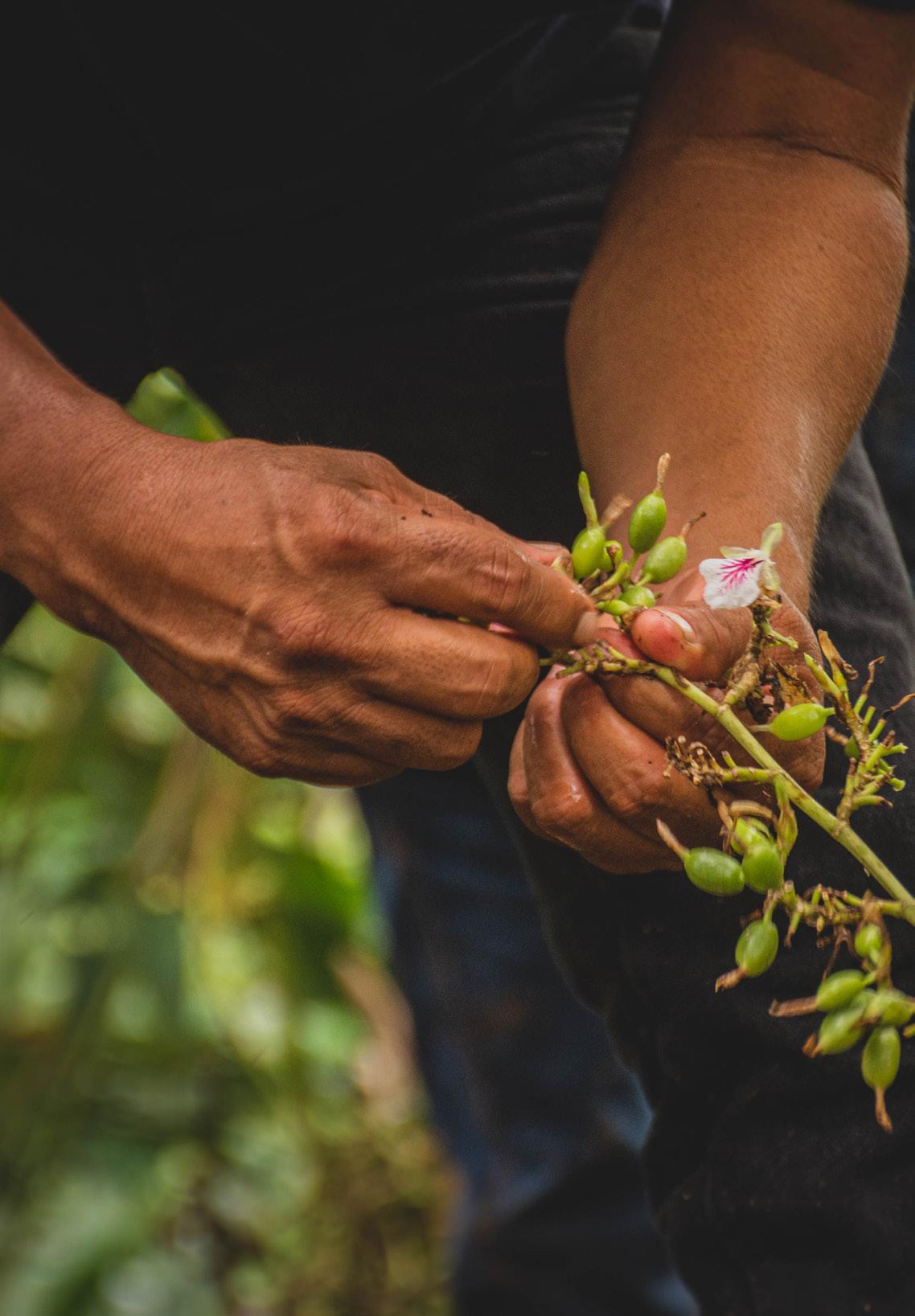
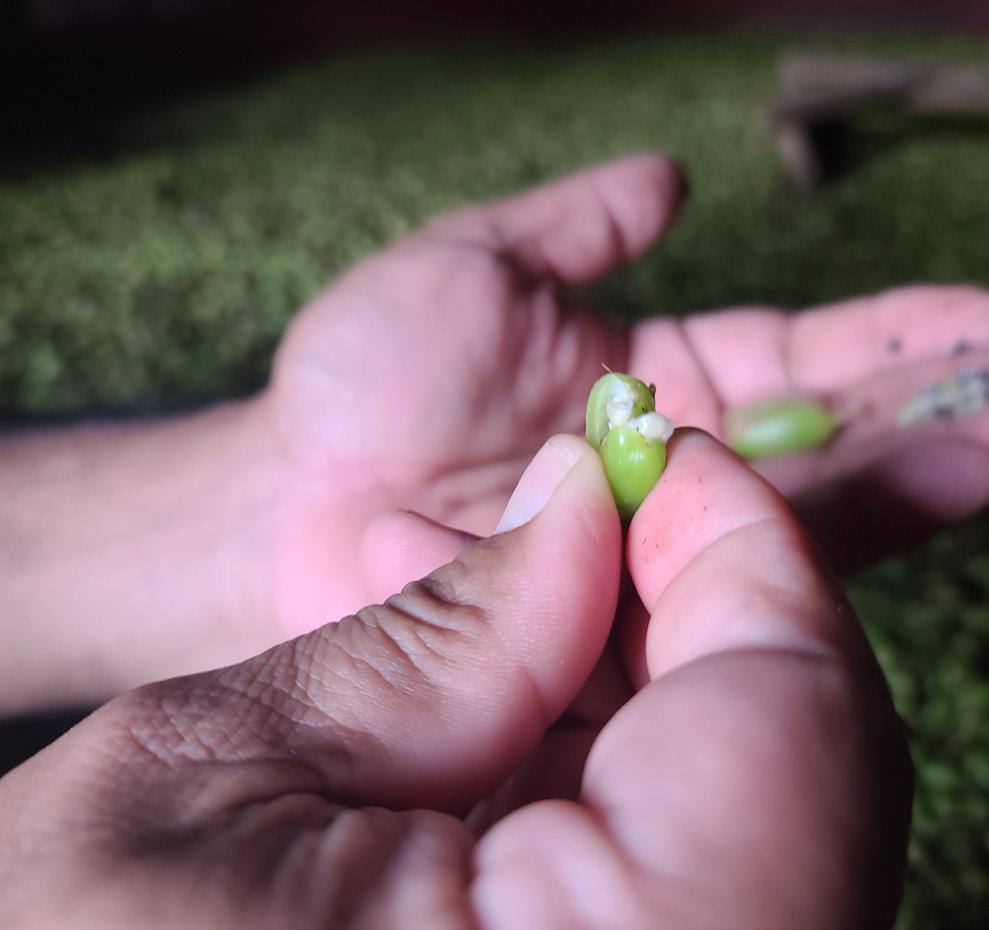
These are but a few examples of the amazing work our suppliers are doing around the world. Our ingredients define us, after all, and only the best will do. The potential for sustainability at farm level is enormous, and we’re continuously looking for ways to farm and forage in balance with nature. But growing beautiful ingredients is only the first step – now we need to move them. For our transportation needs it’s time to turn things over to the logistics team.
21

Logistics
Connecting farms to teacups
Logistics 22
With a new tea concept in hand and vetted sources on board, it’s time to consider how we’ll get the ingredients to our facilities and out to our customers.
Tea, particularly herbal and spice tea, is a global endeavor, and ingredients are often grown in remote areas. First, they need to be consolidated in our production facilities for blending and packaging. Then they need to be shipped out, to wherever our customers are located.
Logistics connects farmers to tea drinkers, with our production facilities in between. With markets in Europe and the Americas, two facilities to service them, and farms around the world, our logistics teams are the glue that holds the business together.
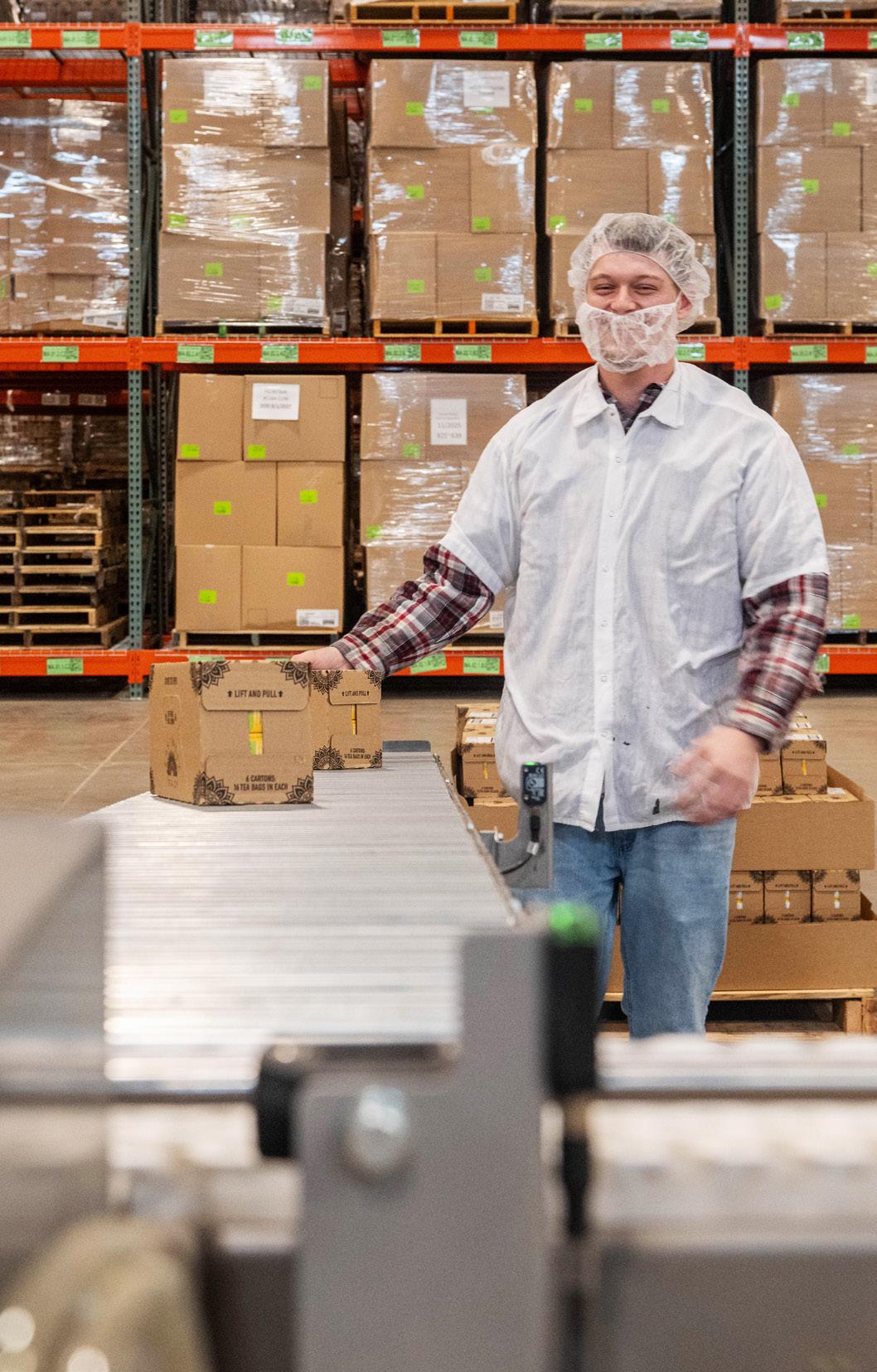
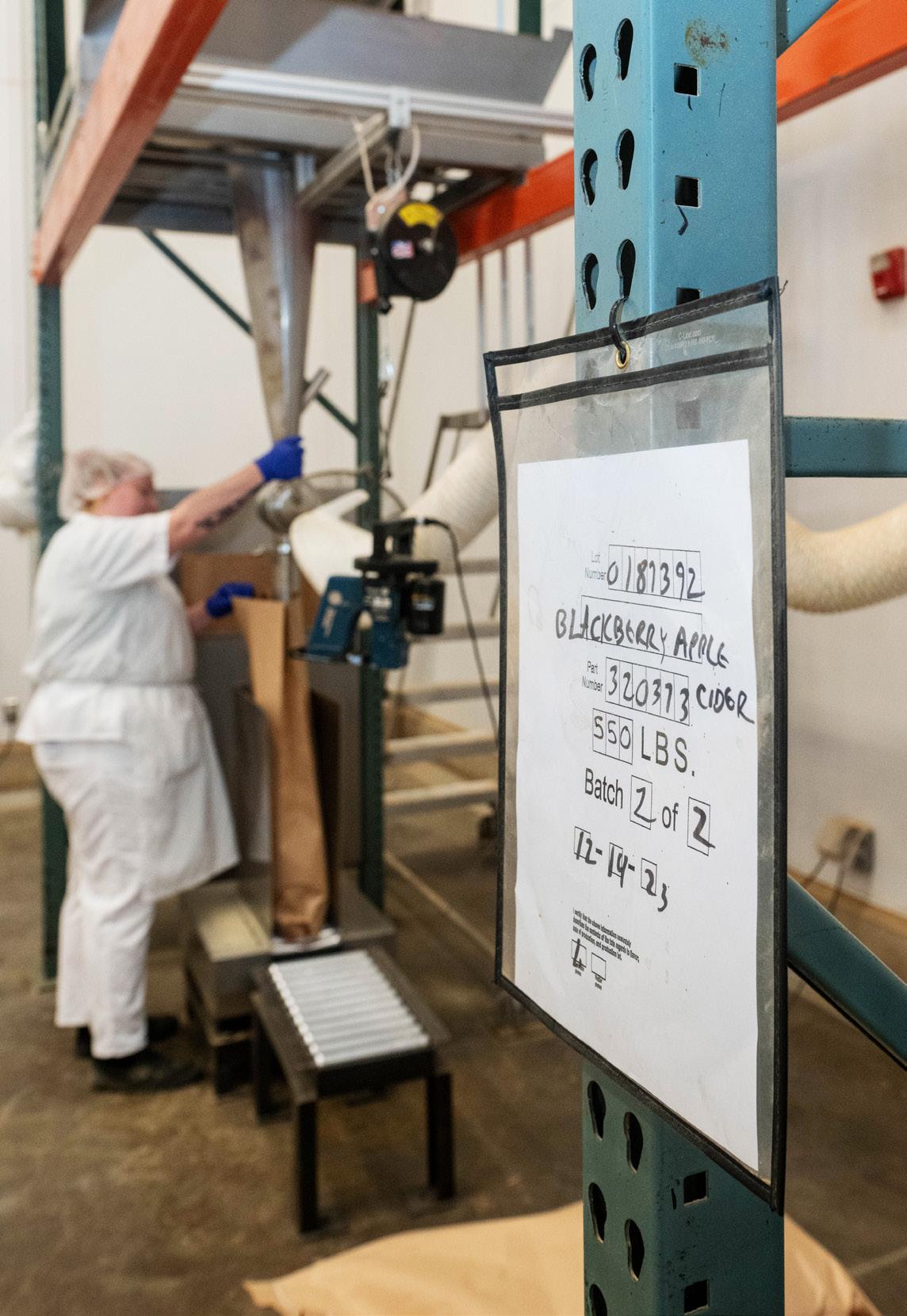
23
The numbers: Here’s what we’re tracking when we assess our logistics performance
Trip distance. The math is simple: the shorter the distance, the less fossil fuel we use. Consulting with our packaging and sourcing teams allows us to source locally as much as possible.
Average weight per order. Lighter shipments require less energy, so anything we can do to cut down on weight matters. From making our boxes lighter to removing extra packing material, every little bit counts.
Number of shipments. The fewer shipments we send, or receive, the lower our transit footprint. This means consolidating pallets on trucks, to economize on space, and working with our sales teams to encourage our customers to buy larger volumes less frequently.
Transportation emissions. All of the above ladders up to our total transportation emissions number. It’s all about carbon, at the end of the day, and all our logistics efforts are going towards lowering our CO2 emissions.

24 Logistics

25
Carbon reduction: five steps to success
Lighter shipments require less energy to move around, so any weight reduction has significant impact. Our packaging team is shaving every spare gram off our packaging, while facilities teams are helping by reducing packing material.
Closely related to weight reduction is space consolidation. Facilities and sourcing teams are reconfiguring pallets to keep all our shipments as condensed as possible. The less empty space we move the more efficient we become.
Working alongside our ingredients and packaging procurement specialists, we prioritize local sourcing. It’s a simple solution: shorter transit distance equals significant carbon savings.
We’re working with our sales teams to consolidate shipments – fewer outbound shipments represent yet more carbon savings. In the EU, we’re even reconsidering minimum order quantities from our retailers to increase efficiency.
Lastly, we’re using less impactful modes of transit. In the US, we shifted all inbound packaging shipments from truck to rail. We’re also working to eliminate air cargo wherever possible.
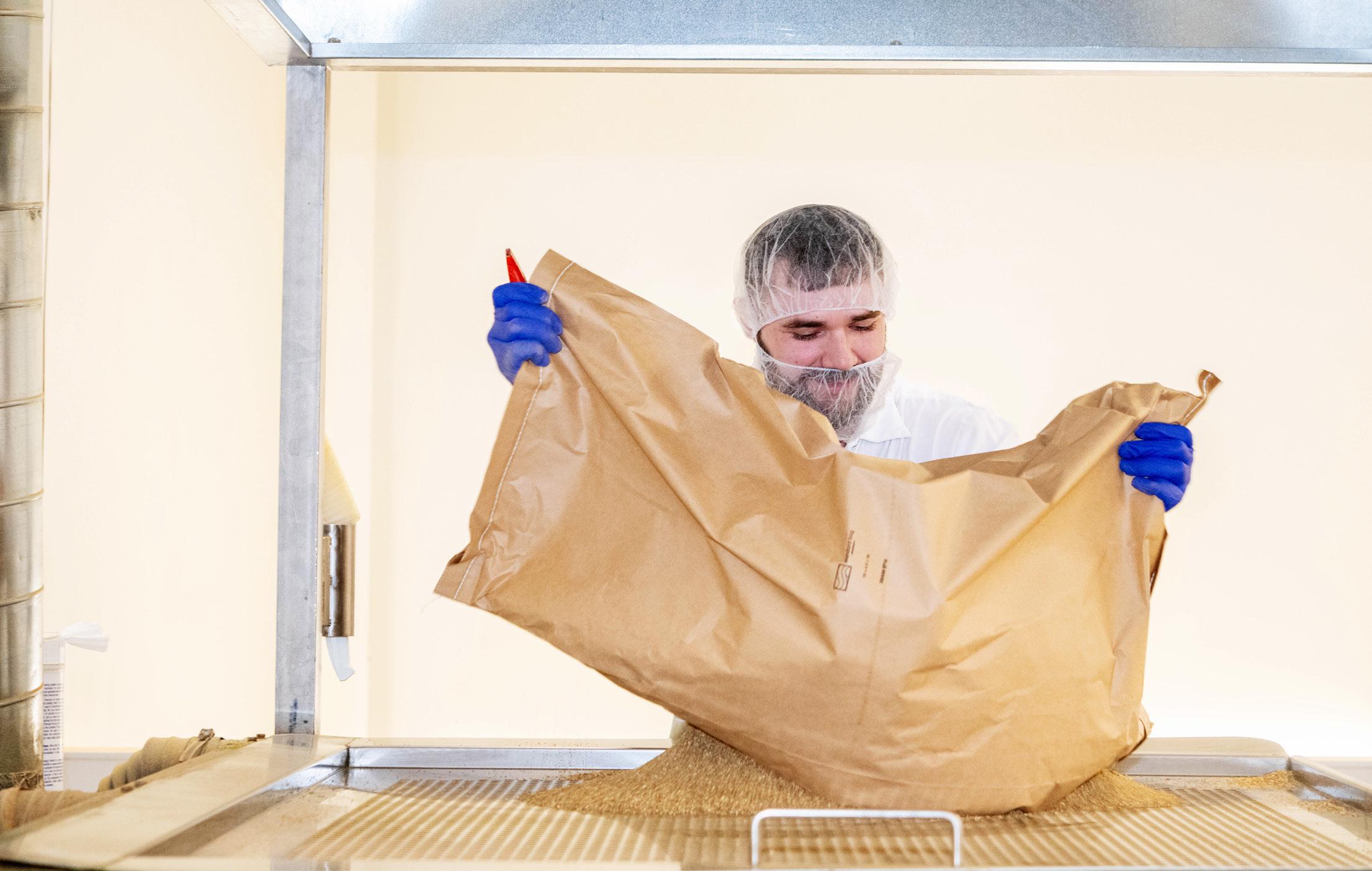
26
Logistics
Tea in motion: driving a sustainable future
The world of logistics never sleeps. Since our materials are always on the move –coming off farms, into factories, and out into the world – our teams are aiming at moving targets.
A sustainable transportation future needs big-picture planning. We’re mindful of new, game-changing technologies, and keep abreast of software solutions that measure and track progress.
But that’s only half the battle – we still need to manage our day-to-day operations. That means handling individual instances of tea in transit: did something get shipped incorrectly?
Maybe a customer wants to return some extra product. Whatever the case, we take great care in solving daily challenges in a way that aligns with our sustainability goals. Logistics enable our business to function.
By the time a box of our tea finds its way to you, every aspect of its journey has been scrutinized: from where it comes from, to how it’s moved, to how it’s packed. The next phase of our tea journey takes us to our facilities, where our teamaking teams do what they do best: blend and pack the best teas on the market.
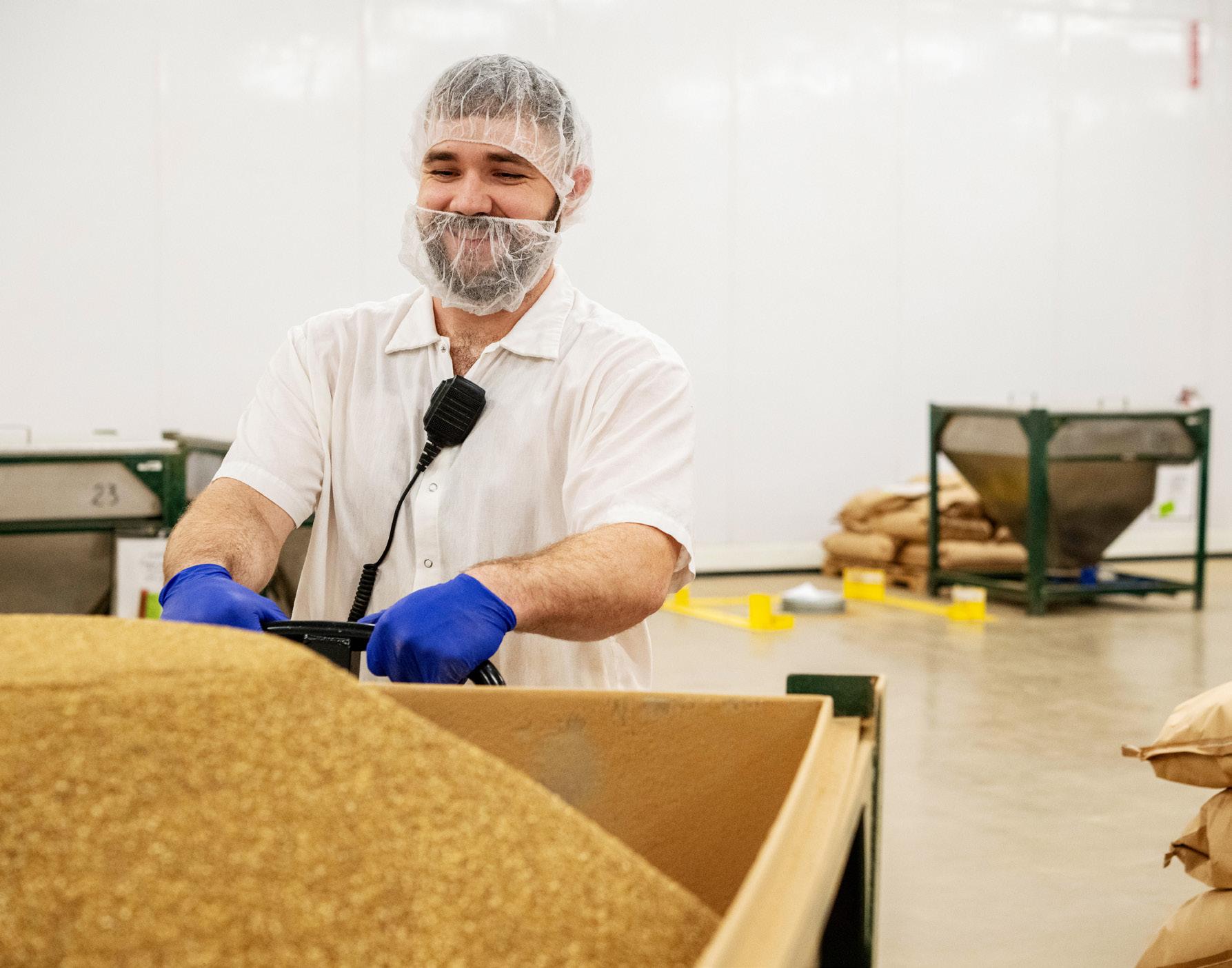
27
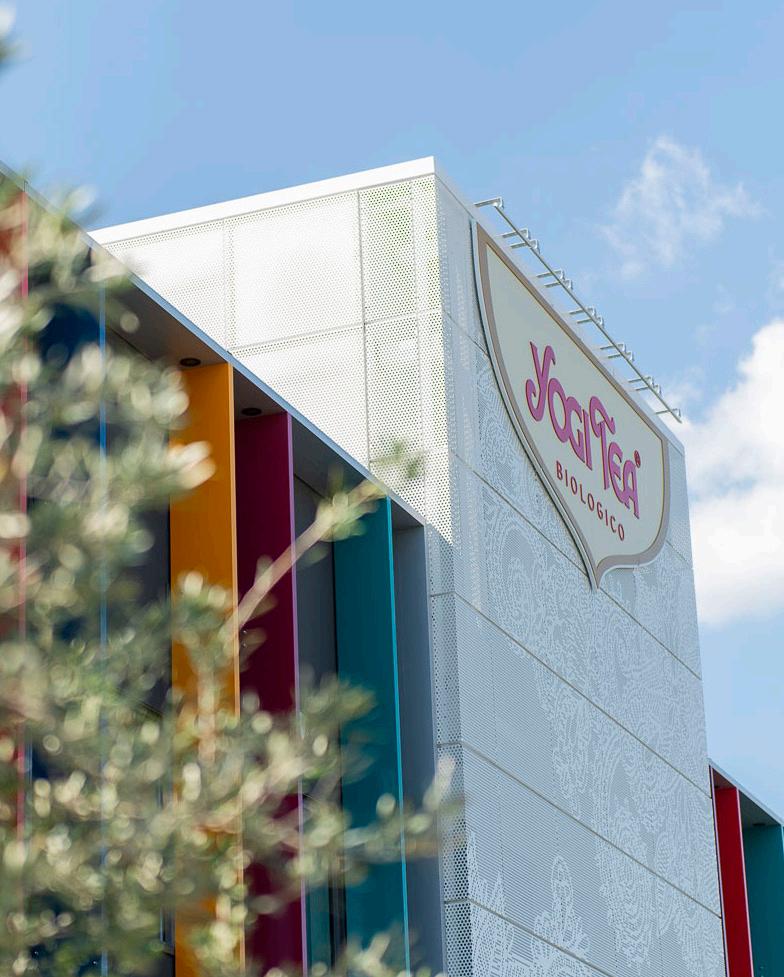
Facilities 28
Where Yogi and Choice become real Facilities
With a tea concept, sustainable sourcing, and logistics in place, it’s time to make some tea.
Our facilities are Yogi’s beating hearts: where quality control, blending, packaging, and distribution happen.
Our twin production facilities in Eugene, Oregon, and Imola, Italy, are among the world’s best. Efficient, sustainable, and home to the best teamaking teams anywhere.


29
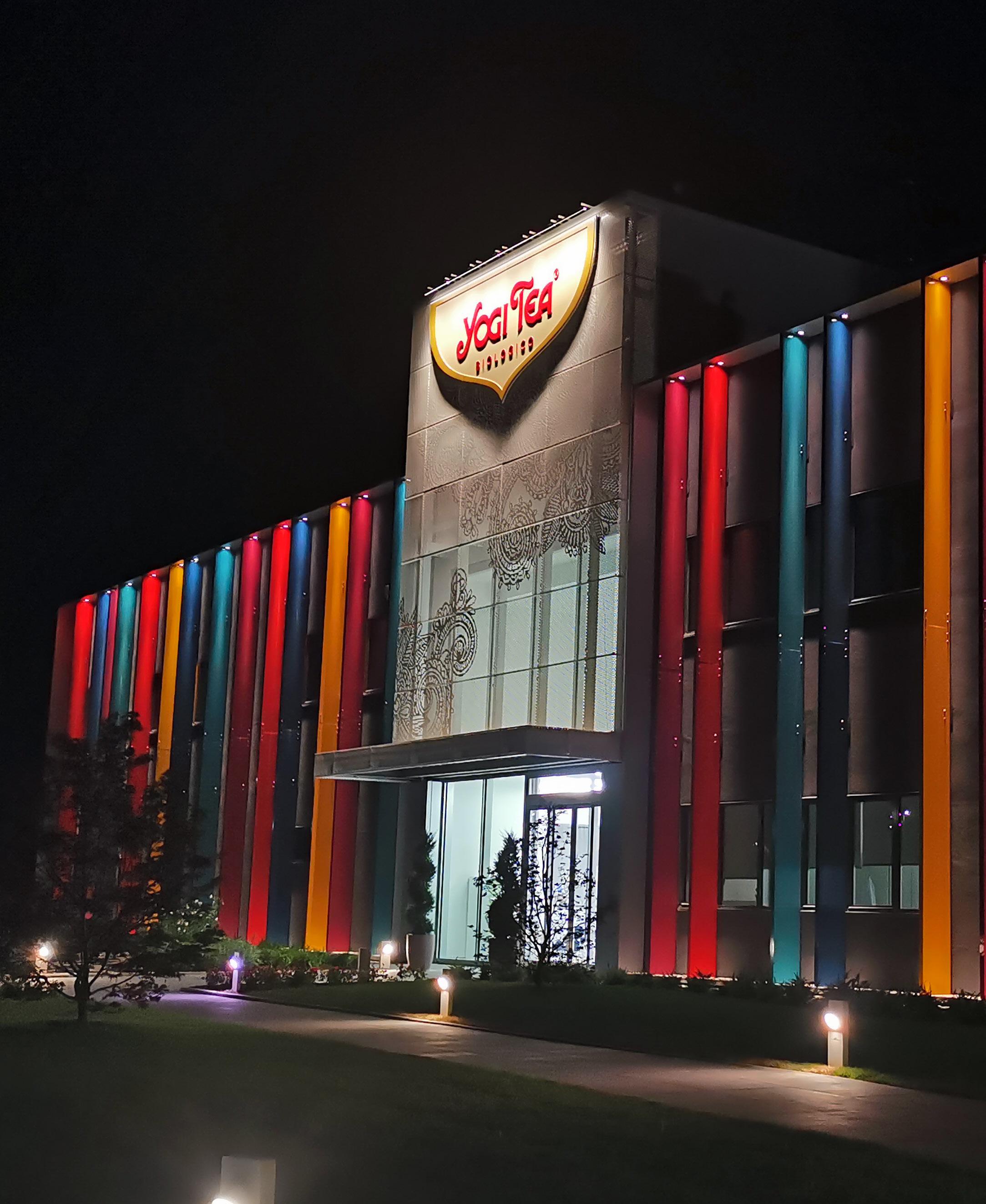
TeaPak s.r.l. SB
In Emilia-Romagna, one of the culinary capitals of the world, also known as “Packaging Valley,” TeaPak sets the pace for sustainable tea production globally. No detail is left unexamined in the constant pursuit of excellence.
Facilities 30

TeaPak embodies sustainability. At top level, sustainability metrics are integrated into managers’ and directors’ yearly targets. These add sustainable thinking to the tiniest decisions: even the small stickers placed on finished products have been improved with non-fossil fuel derived materials.
The facility itself is a shining example of forward thinking and careful day-to-day management. It runs on 100% certified renewable energy, eschews fossil fuels entirely for heating, uses solar panels for hot water, and even deploys a heat recovery system which allows the heat generated by production machinery to warm other rooms in the factory.
Sustainability continues outside. Well over half of their packaging material suppliers are located within 300 km of the facility, cutting down on transit emissions. Finished teas are distributed by train, avoiding the higher emissions generated by trucks. All company-related travel is carbon compensated too.
TeaPak is a champion of social causes, donating to the construction of a “Mother’s Room” at Imola’s public hospital, a comfortable space for newborns suffering from pathologies and their mothers. TeaPak was named “Europe’s #1 Company for Inclusive Policies on Religion” by the REDI Index in 2023, and even supports a corporate forest in Kenya to facilitate reforestation.

Sustainability informs every decision. Workwear is made from Global Organic Textile Standard material. The employee canteen only serves vegetarian food. The toner in printers is under scrutiny, only Blue Angel certified products are allowed, and even company servers were migrated to Green Cloud Certified hosts. No stone is left unturned in TeaPak’s quest for sustainability.
If that wasn’t enough, TeaPak is active in their local community. When flooding hit EmiliaRomagna TeaPak donated hundreds of volunteer hours. Employees are engaged in local renewal projects, including the adoption of fruit trees in Italy and beyond. Workshops, education, and outreach complete a remarkable commitment to sustainability – they even produce their own sustainability report, which you can find on their website!
A holistic outlook and consistent excellence sets TeaPak apart. From getting the big picture right to carefully adjusting the tiniest details, they’re an inspiring example of what mindful intention can do – not just in tea, but any industry.
31
Average Electricity Use/Month 110,000
Total Waste Recycled Recycle & Recovery = 178,485 kg Repurpose = 2.057 kg Trash (landfill) = 737 kg Average Landfill Diversion Rate 99,6%
kWh (100% certified from wind power)
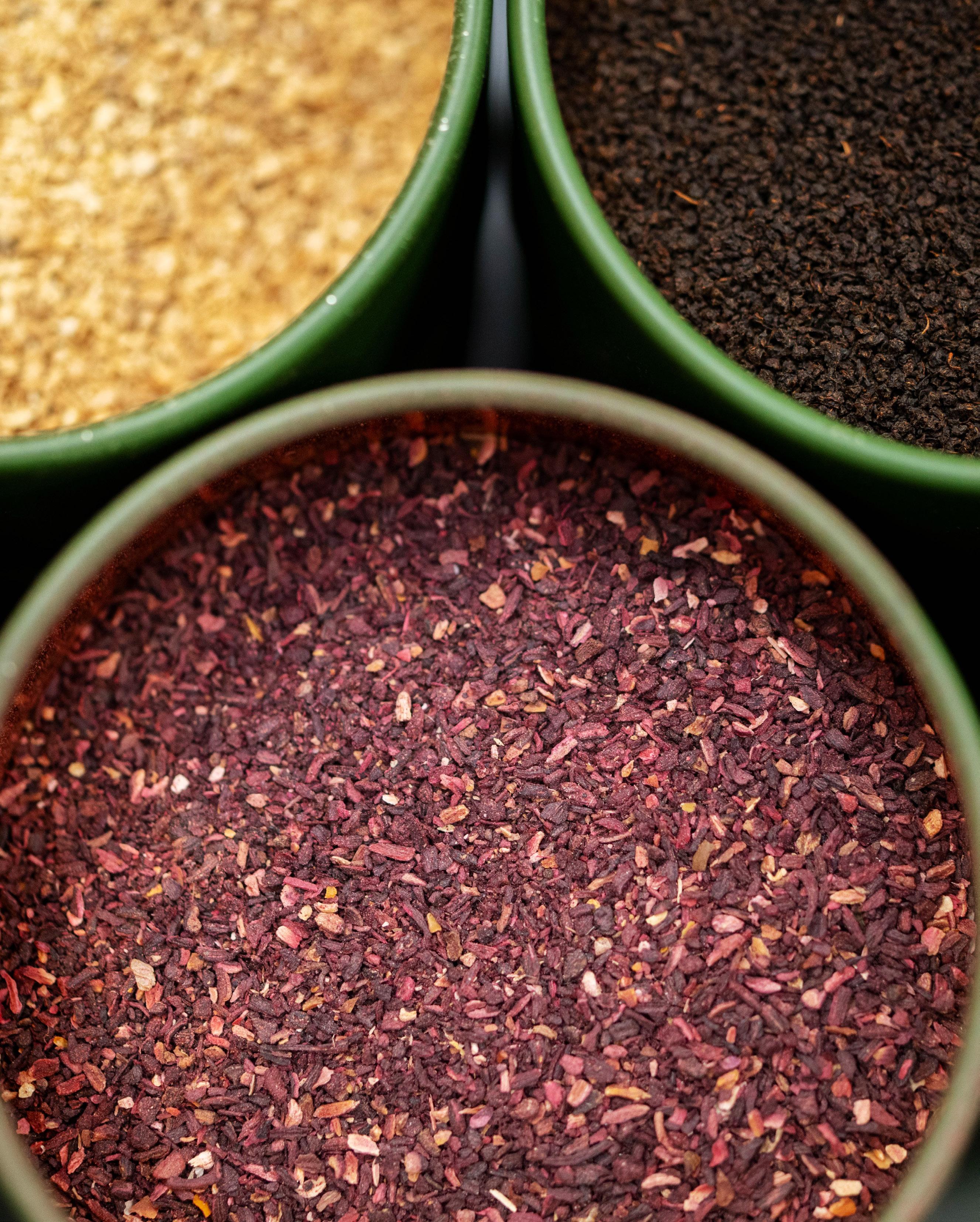
Yogi Eugene
In Eugene, Oregon, stands the world’s first LEED certified tea production facility. It was designed with sustainability in mind: from the materials in its construction to the way we operate it day to day.
Facilities 32

Here, sustainability takes many different forms. First and foremost is measurement. Waste from blending equipment, conveyor belts, and packaging machines is tracked, down to the last pound. Energy usage is monitored from day to day and hour to hour in search of greater efficiency. Natural gas usage, wastewater, garbage, and recycling are all monitored. Even employees’ bike to work miles get recorded so they can be paid by the mile for reducing carbon emissions.
Sustainable facilities management is a daily practice: incremental changes, made gradually over time, improve performance bit by bit. From HVAC efficiency to careful scheduling of peak power usage, diligent management and careful measurement are always priorities.
33
Average Electricity Use/Month 156,000 kWh Total Waste Recycled 441,000 lbs Average Landfill Diversion Rate 62%

Making the grade: B Corp Certification
Facilities 34
2023 was the first year that our entire organization – our European headquarters in Hamburg, as well as our production facilities in Italy and Oregon – all earned B Corp Certification.
Only 3% of the world’s B Corps are based in Italy, and we couldn’t be prouder that TeaPak is one of them. After an enormous amount of effort, certification was earned in October 2022 with a B Impact score of 108.5 – smashing the 80 required for certification, and more than doubling the median score of 50.9 that ordinary businesses earn.
Our Eugene facilities are no stranger to B Corp Certification, having held and maintained excellent scores since 2014. Our last score was a personal best, however: 129.3! We’ve picked up several B accolades over the years as well:
Best For The World: Overall 2019
Best For The World: Changemakers 2019
Best For The World: Changemakers 2018
Best For The World: Changemakers 2017
2023 was the first year our European headquarters earned their B Corp certification, making us completely B for the first time. It was a strong showing, too: 117.6, scoring particularly highly in the environment and community categories.
B Corp certification verifies that sustainability is built into the legal framework that dictates how our business operates. From worker well-being to diversity, equity, and inclusion, the B Corp audit is a thorough and rigorous process that takes a holistic view of what businesses do.
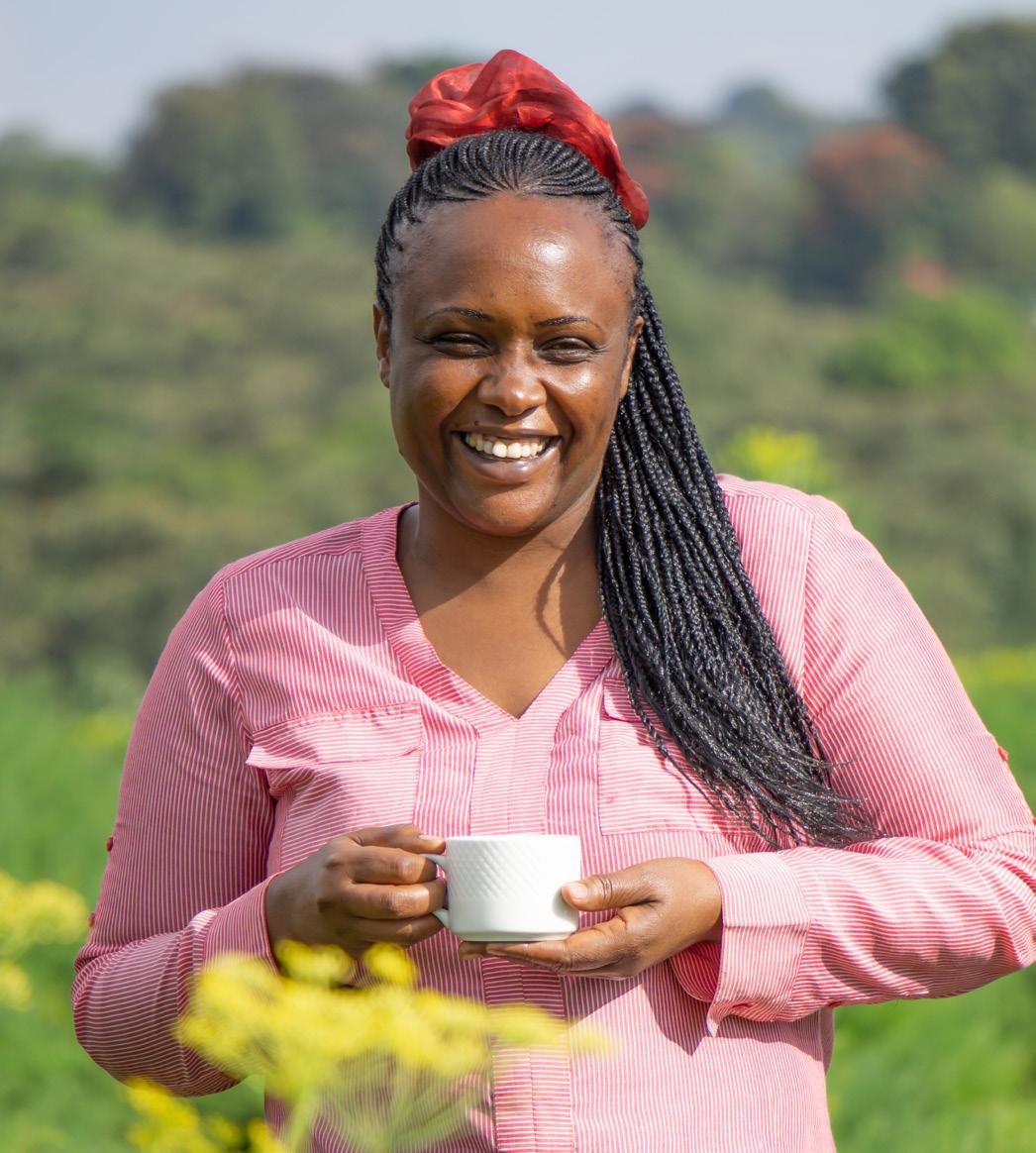
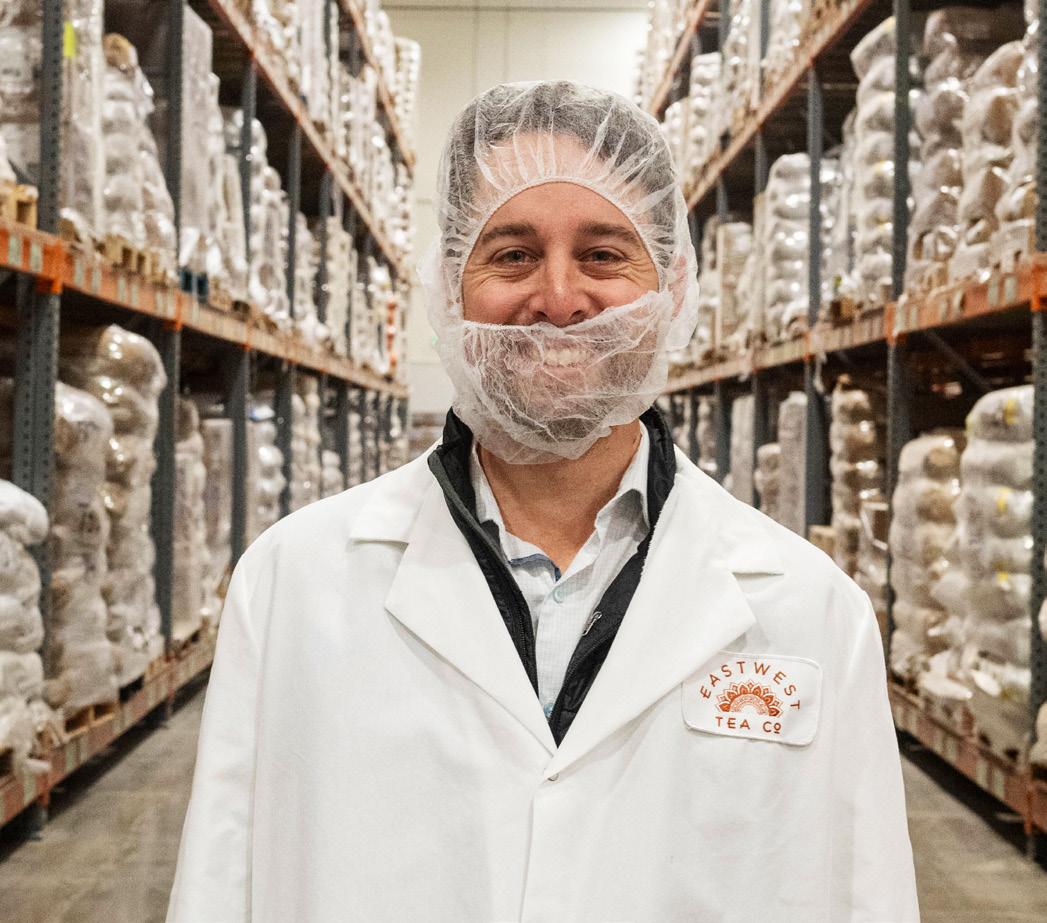
35
Upcycling: Thinking differently about waste
Some waste is straightforward to manage. We can use clean energy, engage with municipal recycling, and compost organic matter to account for lots of the waste we produce.
But there are other opportunities to ensure that we’re honoring our ayurvedic roots by producing teas in balance with nature. In Eugene and Imola, our teams have devised creative upcycling solutions to keep our materials circulating and useful for as long as possible.
In Eugene, we collect our plastic waste and sell it to a producer of resilient outdoor flooring. What we used to send to a recycling plant, with no guarantee it’ll get reused, we are now certain is getting a new life.
In Imola, starting in 2024, all used Personal Protective Equipment is going to be collected and transformed into soundproof panels and athletic flooring.
One man’s trash is another man’s treasure, as the saying goes, and we spend a lot of time and energy finding the most sustainable, productive home for all our materials – the ones we account for as a matter of course, and the ones that take a little extra effort to collect and transform.

Facilities 36

Building tools: Our global carbon database
In 2023 we developed a powerful new tool to help in our sustainability work: a global carbon database. This initiative allows us to get real-time updates on our carbon impacts, wherever they occur – from transit to production.
By developing our capability to understand and evaluate how any change, proposed or actual, effects our emissions, we can keep carbon in mind constantly. We’re continually improving our data collection process, checking our work, and looking for new information sources. Like the gauges in a racecar, our carbon database gives us immediate feedback about what’s happening throughout the organization and keeps us on track.
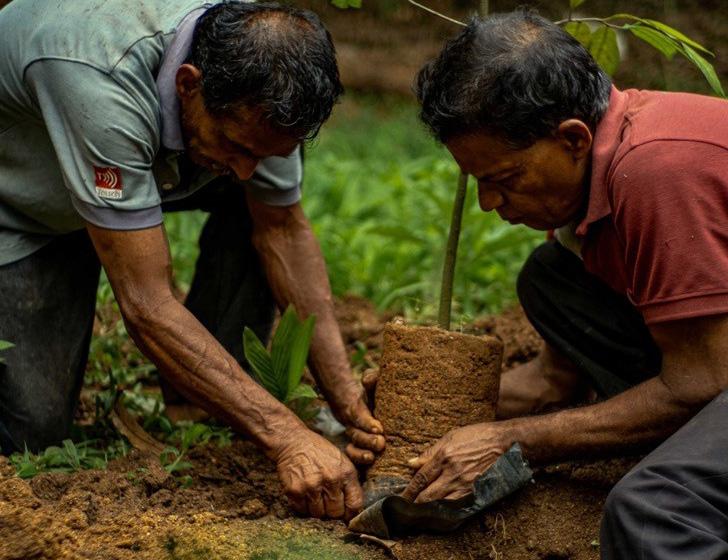
We aren’t farmers, or truck drivers, or boat captains, or packaging manufacturers, or waste management professionals. And yet, we consider our activities in all those areas to be part of our impact. For us to know if our initiatives are making a difference, we need to understand exactly what those efforts are seeking to change. And that means lots of measuring: carbon footprints, packaging waste, energy use, transit emissions, and lots more. Our new database is a powerful tool that can guide us for years to come.
We’re proud of our facilities’ sustainable practices, careful management, and overall excellence. But the magic isn’t limited to efficient machinery and precise blending. We bring the best ingredients in the world into our facilities, but it’s important to put those ingredients into something equally nice when they embark on the next stage of their journey. That’s where our packaging teams take over.
37

Care for every detail Packaging
Packaging 38

From
a sustainability standpoint, packaging is as important as any ingredient. With our tea blended and ready, our packaging teams take responsibility for every container our teas inhabit as they travel to mugs around the world.
It takes an eye for detail, and care for every tiny nuance, to stay on top of packaging. Our packaging experts in Imola and Eugene stay in tune with local recycling protocols as well as global changes in material availability, taking responsibility for the entire life cycles of the products we use. It’s a dynamic space, and one in which we take great pride.
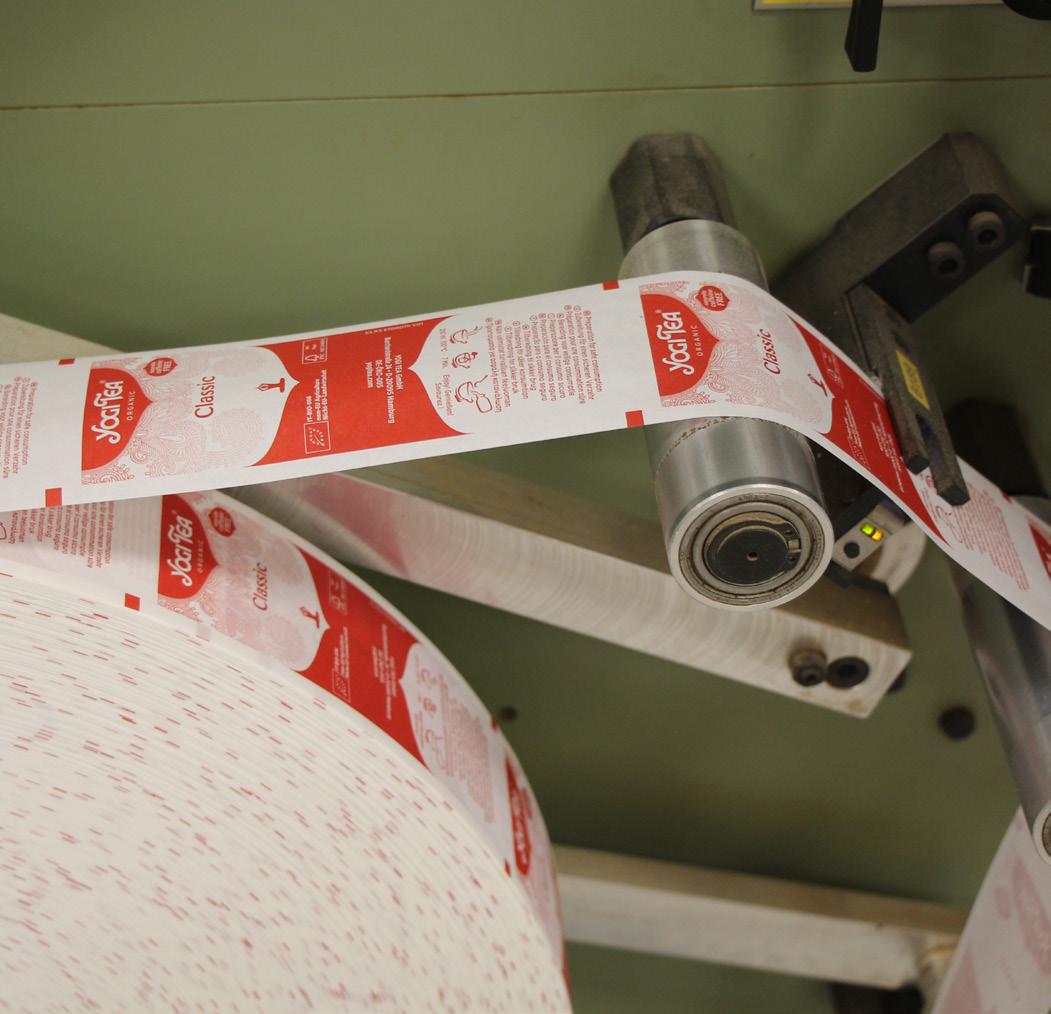
39
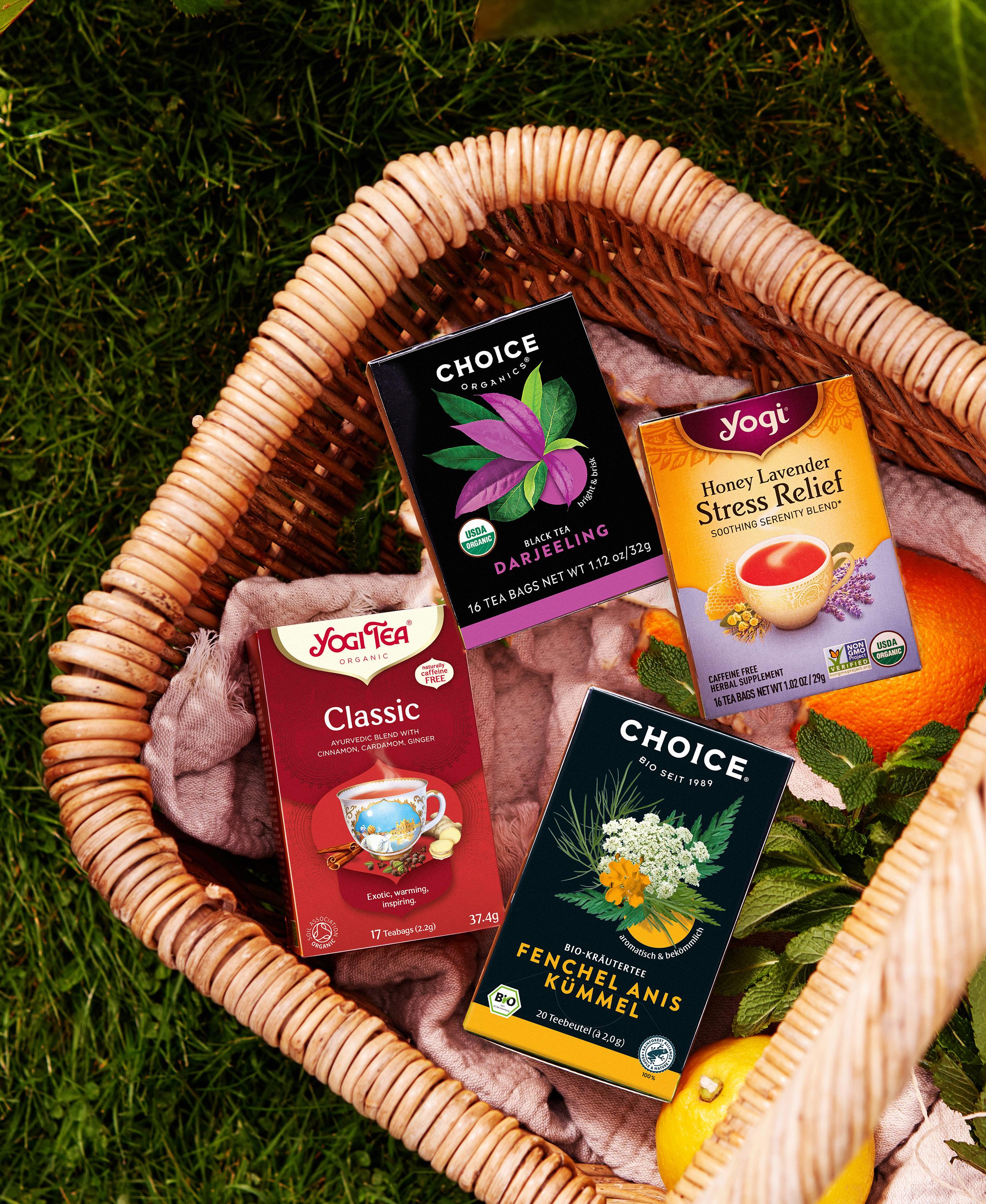
40 Packaging
Back to our ayurvedic roots: Packaging made in balance
We’re always striving to bring our operations into balance with the world that supports them, so we’re always looking for opportunities to minimize our packaging’s impact in its creation, use, and disposal. For example, here’s a closer look at our European packaging:
41
GOTS = Global Organic Textile Standard FSC® = Forest Stewardship Council
FSC® certified Fully recycable Staple free Compostable FSC® certified carton FSC® certified paper FSC® certified filter paper FSC® certified paper Staple free Compostable carton FSC® certified paper 100 % GOTS certified organic co on
Our sustainable packaging scorecard
Early in our sustainability journey, our global packaging teams and sustainability manager strategized about how to improve our packaging. They knew the right changes would reduce our waste while contributing to the overall health of the tea packaging industry.
We developed four global areas of focus: the things we thought we needed to monitor, manage, and improve over time. These inform and guide our approach to sustainable packaging globally.
Reduce our carbon footprint
The biggest thing we can do to reduce our carbon footprint is to make our packaging lighter. Heavier stuff requires more fossil fuels to move around, so every gram we can shave off our packaging makes a difference. We are also mindful of using lower impact materials. Then there’s sourcing: can we get our packaging materials locally to cut down on inbound transit emissions?
Plastic to Product Ratio
We’re passionate about providing the best tasting teas possible, respecting the incredible amount of work and love it takes to grow, blend, and share them. And there’s simply no better material for preserving freshness than plastic! A tiny plastic lining lives in every envelope to keep our teas as nutritious and delicious as possible. We’re determined, however, to make sure that layer is as small as possible, and to keep as much non-recyclable material out of our packaging as possible.
Packaging to product ratio
We’re always looking for ways to reduce the amount of packaging we use to deliver each serving of tea. Sometimes this means consolidating shipments, sometimes it means optimizing how many teabags we should fit into a box. We try hard to keep every aspect of the teabag, envelope, and box as light and small as possible.
End of Life
Once teas ship from our warehouses they’re out of our hands. Whether they get recycled, composted or thrown away is down to our retailers and tea drinkers. But that doesn’t mean we can’t help! We work hard to make sure that our materials are easily disposed of responsibly. That means being attuned to regional differences in waste disposal capabilities, and understanding, down to the last detail, how we can make sustainable practices as accessible as possible for everyone.

42
Packaging
21 %


Packaging Carbon Footprint Breakdown



European packaging wins
90% of packaging materials sourced regionally (within 300 km of TeaPak)
1000 km distance equivalent avoided by reducing packaging weight
52,958 kg of paper saved annually by reducing Yogi Tea box weight
25,574 kg of plastic saved annually by improving envelopes’ disposability
1,000 kg paper saved annually by reducing Yogi tea tag weight
Increased use of recycled fibers by 13% in Choice cardboard shipping unit
33
North American packaging wins
85,000 lbs packaging material saved per year
Removed excess packing material from inbound shipments of tea tags
Reduced box weight by removing internal printing
Transitioned from truck to rail for all inbound envelopes and tags
Reduced weight of all tea tags
Sustainability is where packaging becomes a creative and exciting endeavor. We’re advocating for sustainable outcomes not just for ourselves but for our tea drinkers, our partners, and even our competitors.
We’re a proud member of the One Step Closer Packaging Collaborative – a group dedicated to developing and disseminating sustainable packaging solutions around the world. By combining our efforts and sharing our knowledge we’re contributing to a better, cleaner, easier packaging world for tea lovers everywhere. With our tea blended and packaged, it’s time to send it over to our retailers – who are also meaningfully engaged with sustainability in unique and interesting ways.
43
% Envelopes
% Carton 14 % Trade Marketing Products 5 % Tea Tags
% String 5 % Filter Paper 2 % Staple Wire
17
3
Other Packaging
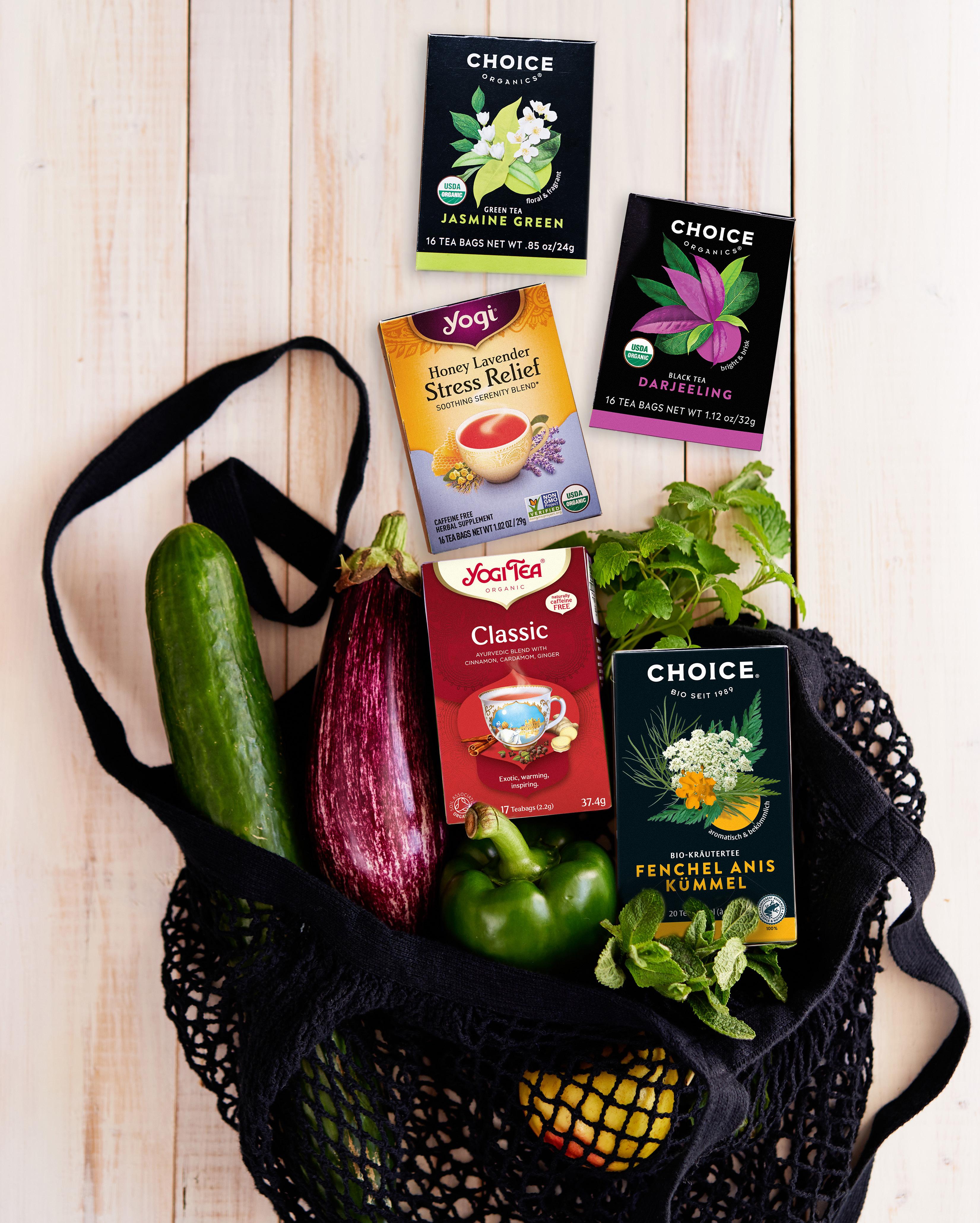
Celebrating our community Sales
Sales 44
We are not alone in our sustainability work – far from it. And we think it’s important to give credit to others in our global tea community. After all, our business couldn’t thrive without retailers who feature our products and share our excitement for sustainable tea.
We reached out to several of our retail partners in the Americas and Europe and invited them to share their work with us. Here’s what they came back with: unfiltered looks at how retailers can make a difference in our teas’ sustainability journey.

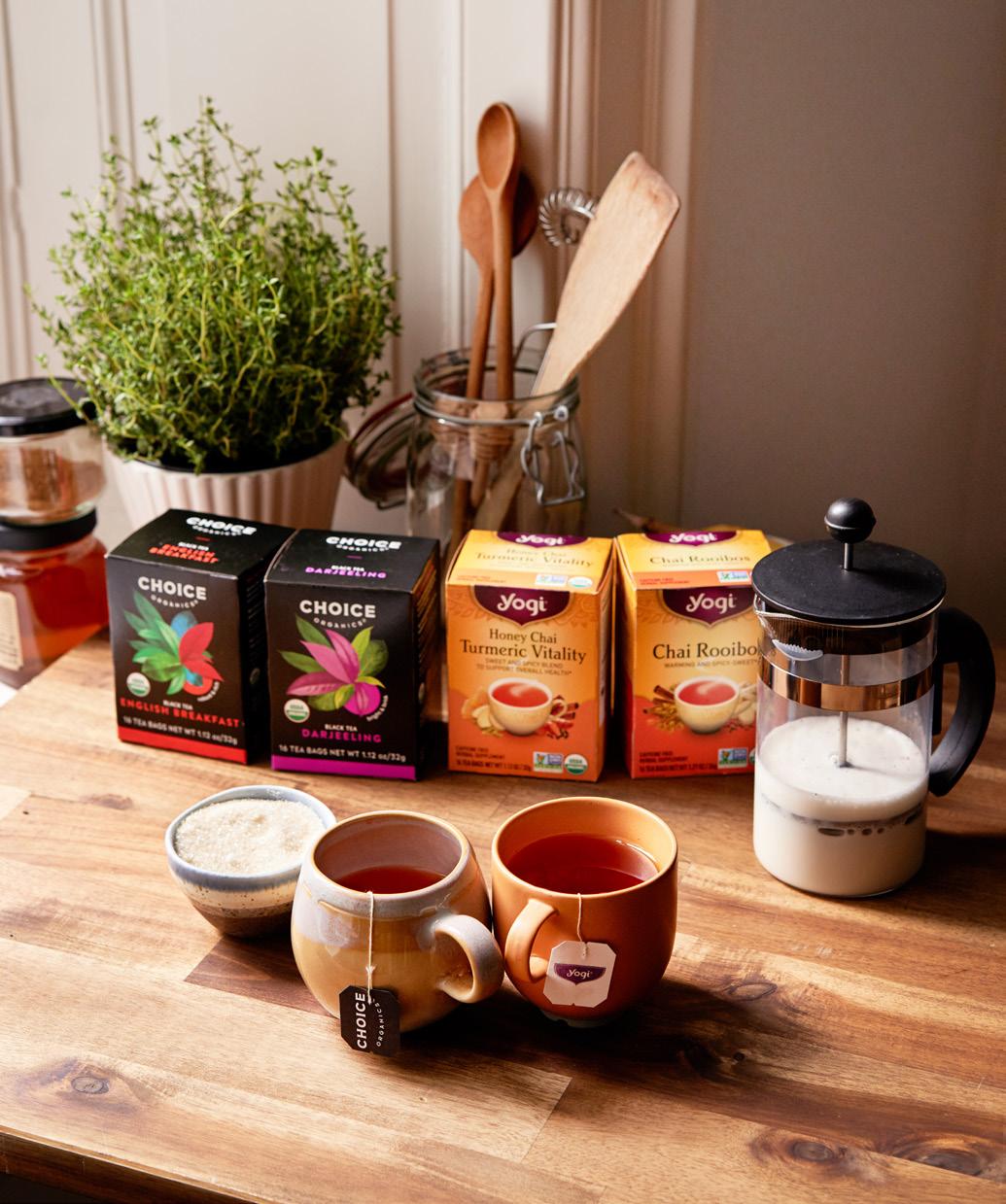
45
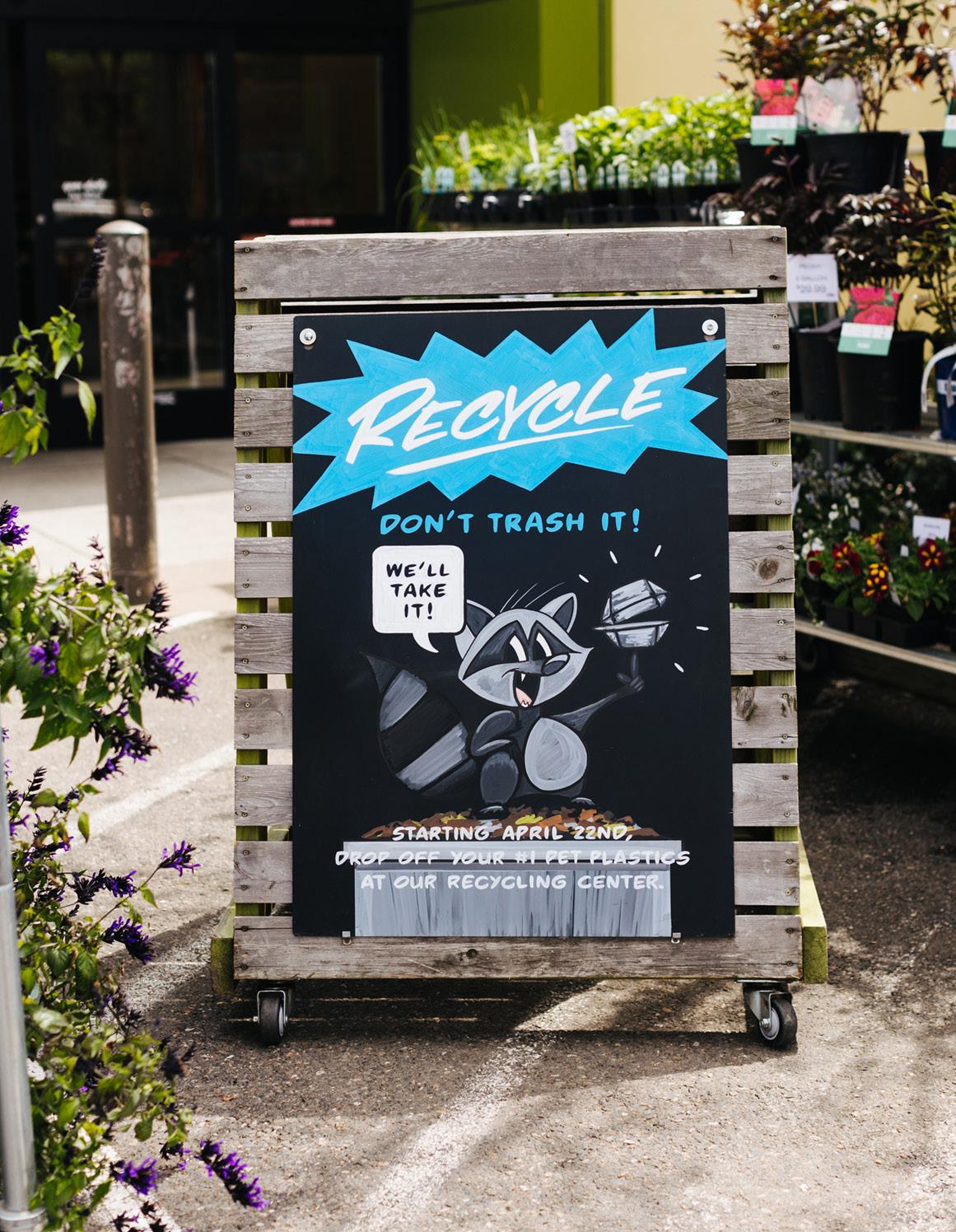
New Seasons Market
New Seasons Market are excellent neighbors to our Eugene facility. B Corp certified and active in our community, we reached out to them to share a bit about their sustainability work. Here’s what they said:
Sales 46

“New Seasons Market opened in 2000 in Portland, Oregon with a goal of connecting its customers with the folks who produce their food. As the world’s first Certified B Corp grocer, its mission is to honor local farmers, ranchers and makers while helping its partners, the community and the environment prosper. Sustainability has been part of the company’s DNA since the beginning, and - in April 2022 - New Seasons Market launched a circular packaging program to create value out of something previously considered ‘waste.’
The circular packaging program is focused on recovering #1 PET containers from customers, and working with respected partners to recycle the materials into packaging for grab-and-go items at New Seasons Market’s own stores. The containers are made with 100 percent postconsumer recycled content and feature design details that reduce the total amount of plastic used by 10 percent (compared to the previous containers), including a tamper-evident button instead of a wasteful, removeable strip. Since New Seasons Market started collecting #1 PET, the grocers’ customers have overwhelmingly embraced the program, recycling more than 200,000 lbs.”

47
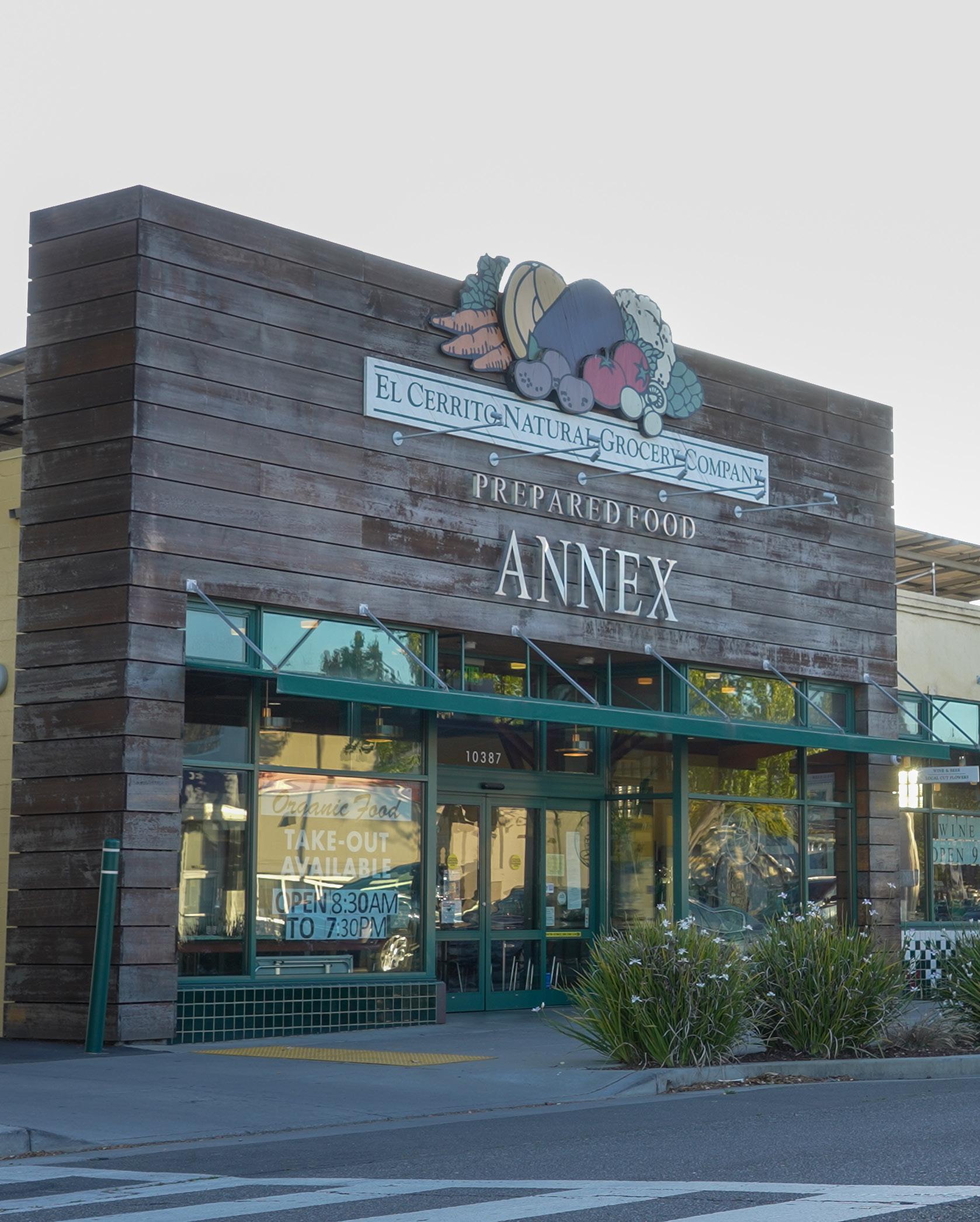
INFRA
We can always get more done when we work together. INFRA unites hundreds of conscientious organic and natural foods stores around the US. Here’s what they have to say about their sustainability program:
Sales 48
“INFRA is a cooperative of independent organic and natural food and wellness retailers serving hundreds of communities across the United States. Through collective buying power, operational support, and innovative marketing programs, we help our member’s businesses thrive in step with their values and communities, a fast-changing industry, and the planet we share. Working at the center of the natural foods ecosystem, INFRA acts as a deal-maker, opportunity-finder, and roadblock-clearer for members through collaboration with our valued vendor partners, like Yogi.
Our Vision
We see a future where independent natural food retailers are thriving at the heart of every community, strengthening their local economies, and committed to making healthy, sustainable food accessible to all.
Our Mission
Strengthening our members through collaboration to forge a sustainable future.
Our Impact
At INFRA we believe that healthy soil is the foundation of our global food system. As populations and food production demands grow, keeping our soil healthy and productive is paramount for sustaining plant, animal, and human life.
Our vision is about more than food, it’s about nourishing people in all ways and advocating for access to affordable, high-quality, and culturally significant foods for everyone. We know that diversity of identities, experiences, and ways of thinking results in stronger lives for all our members and the communities we serve. We pledge to continue the long journey of working to create meaningful change within ourselves and our realm of influence.
We are committed to working with industry partners who align in values that translate in the supply chain from sourcing to product attributes at shelf. These include Non-GMO Project Verified, regenerative agriculture practices, BIPOC owned, Biodynamic, B Corp Certified, Fair Trade, packaging that is compostable and/or recyclable, and wellness ingredient sourcing and transparency.”
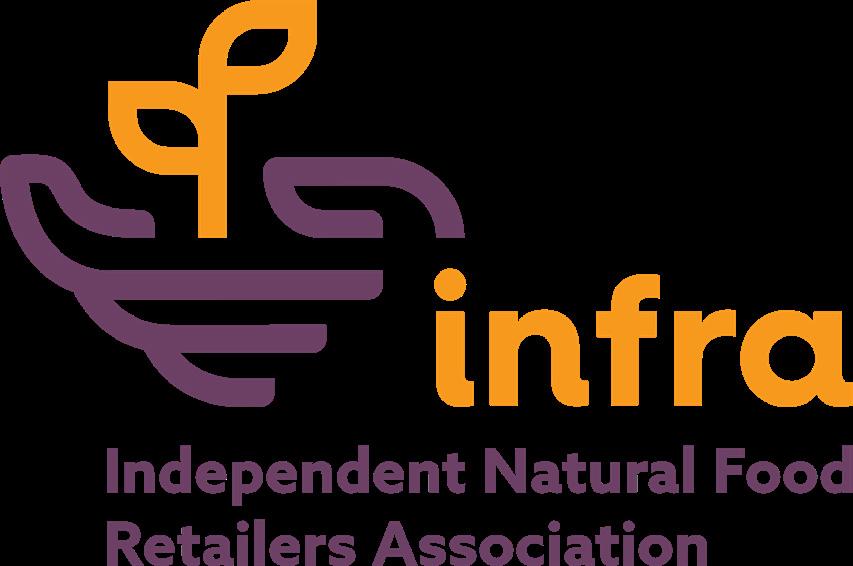
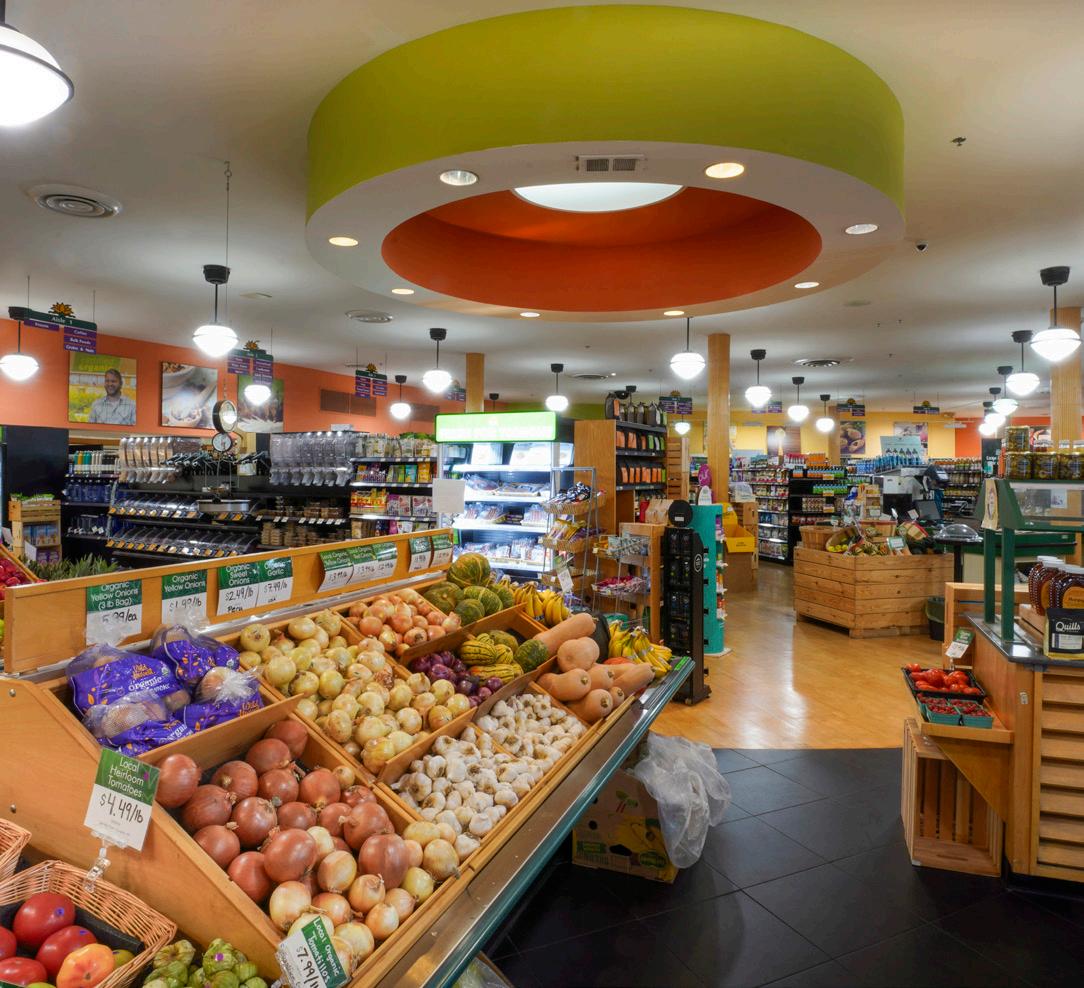
49
Biocoop
Yogi is an international company and our retail partners are too. Biocoop celebrates French culinary tradition with an eye towards an equitable, sustainable future. Here’s how they describe their sustainability efforts – first in French, of course!

BIOCOOP ET L’AGRICULTURE BIOLOGIQUE, UNE HISTOIRE INTIMEMENT LIÉE
Depuis plus de 35 ans, la raison d’être de Biocoop n’a pas bougé : développer l’agriculture biologique dans un esprit d’équité et de coopération. Année après année, l’enseigne perfectionne un modèle commerçant crédible face aux défis de la planète, à travers un réseau de plus de 700 magasins indépendants.
Biocoop reste aujourd’hui cette entreprise singulière née en 1986 ayant posé sa raison d’être avant même son modèle économique. Son ambition ? Œuvrer pour le développement d’une agriculture bio paysanne de proximité et d’une consommation plus responsable grâce à l’animation d’une communauté d’acteurs soucieuse de faire émerger des alternatives sociales, écologiques, équitables et durables. Et depuis 35 ans, Biocoop ne cesse de fournir la preuve de l’efficacité de ses solutions autour d’une posture ferme : des produits 100 % bio, 100 % de saison en fruits et légumes, très majoritairement d’origine France, jamais transportés en avion, sans OGM aucun !
Biocoop souhaite apporter des solutions concrètes pour accélérer la transition écologique
Idéaliste ? Non, simplement les pieds sur terre et dans la terre! Face à des risques clairement identifiés et accélérés par un réchauffement climatique certain – pénurie alimentaire, disparition de filières, concentration des circuits de production et de transformation, pollution généralisée… – la coopérative actionne les leviers qui sont les siens depuis son origine…
Mots d’ordre : créer de nouvelles filières françaises, rapprocher producteurs, transformateurs et consommateurs. Donner la priorité au local et à l’origine France avec une limitation de la distance parcourue par les matières premières et les produits. Limiter les emballages et les déchets. Réduire son empreinte carbone et ses consommations énergétiques… Biocoop est sur tous les fronts pour relever le défi écologique.
Sales 50
Biocoop souhaite apporter des solutions concrètes pour une alimentation bio exigeante pour tous Une enseigne sans concession sur la bio, la naturalité, la saisonnalité, 100 % pour une agriculture de proximité !
Biocoop promeut plus que jamais une alimentation saine, goûteuse, de saison, frappée de naturalité. Fidèle à ses principes originels, la Coopérative ne lâche rien sur les modes de production, le respect de la biodiversité, des semences, et surtout des femmes et des hommes qui travaillent la terre.
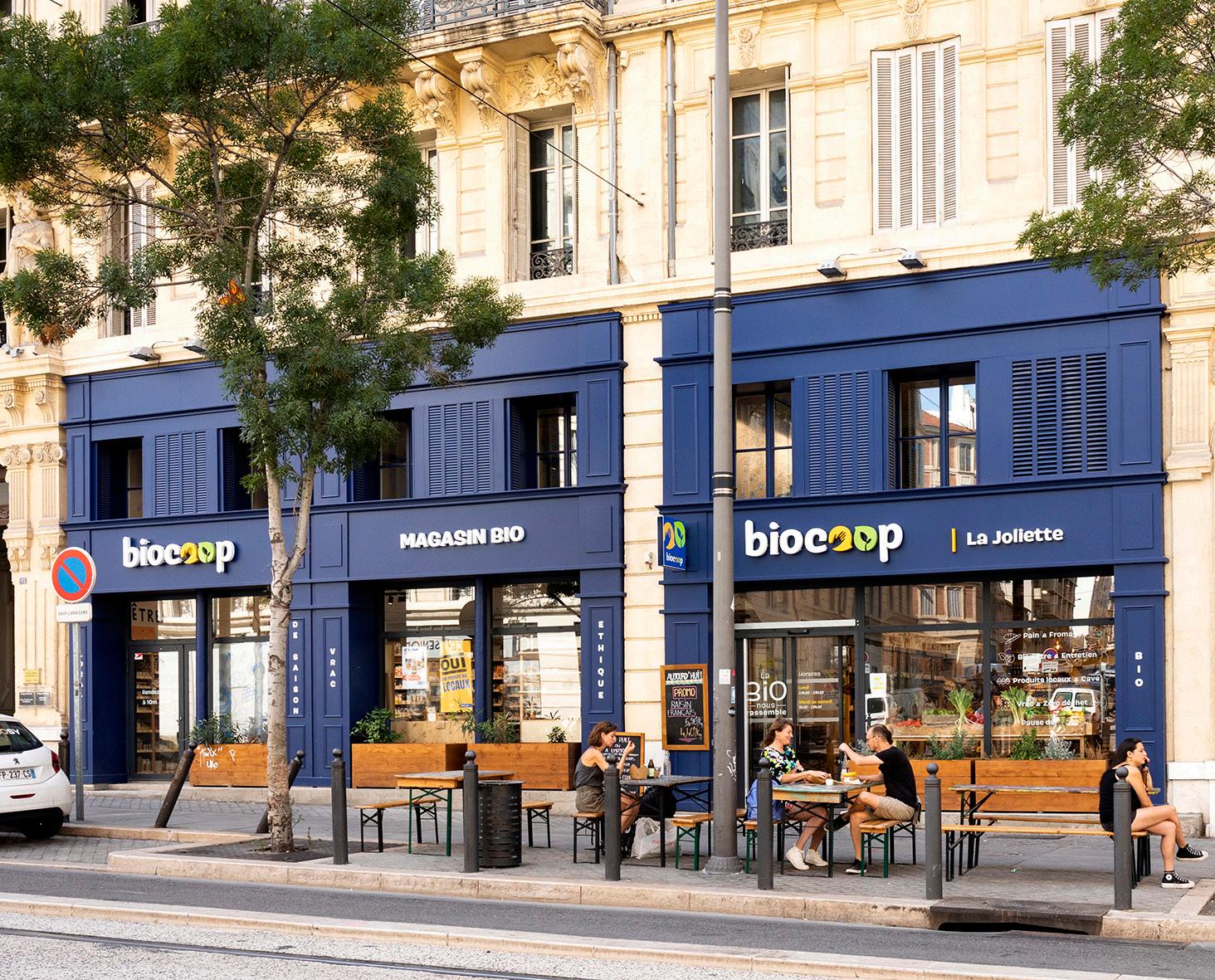
BIOCOOP AND ORGANIC AGRICULTURE, AN INTIMATELY LINKED HISTORY
For more than 35 years, Biocoop’s purpose has not changed: to develop organic farming in a spirit of fairness and cooperation. Year after year, the brand perfects a credible retail model in the face of the planet’s challenges, through a network of more than 700 independent stores.
Biocoop remains a unique company today, born in 1986, having established its purpose before its economic model. Its ambition? Work for the development of local organic farming and more responsible consumption through the leadership of a community of stakeholders keen to develop social, ecological, equitable and sustainable alternatives. Now for 35 years, Biocoop has continued to provide proof of the effectiveness of its solutions around a firm stance: 100% organic, 100% seasonal fruit and vegetables, mostly of French origin, never transported by plane and without any GMOs!
Côté fournisseurs, Biocoop privilégie des professionnels présents exclusivement en circuit spécialisé bio, fabriquant ou commercialisant à 100 % des produits biologiques, ne vendant pas de pesticides agricoles et en cohérence avec les valeurs de l’ESS. C’est ainsi que nous entretenons une relation de confiance depuis plus de 15 années avec Yogi Tea. Et nous avons encore de beaux défis à relever ensemble.
Biocoop wishes to provide concrete solutions to accelerate the ecological transition.
Idealistic? No, just with your feet on the ground and in the ground! Faced with well-identified risks accelerated by global warming – food shortages, disappearance of sectors, concentration of production and processing circuits, generalized pollution, etc. – the cooperative is activating the levers that have been at hand since its origin… Watchwords: create new French supply sectors, bring together producers, processors and consumers. Give priority to local and French origin with a limitation of the distance traveled by raw materials and products. Limit packaging and waste. Reduce your carbon footprint and energy consumption... Biocoop is meeting the ecological challenge on all fronts.
Biocoop wishes to provide concrete solutions for demanding organic food for all
An uncompromising brand on organic, natural, seasonal, 100% for local agriculture!
Biocoop is promoting, more than ever, healthy, tasty, seasonal food with a natural touch. Faithful to its original principles, the Cooperative does not give up on production methods, respect for biodiversity, seeds, and above all the women and men who work the land.
On the supplier side, Biocoop favors professionals that are present exclusively in specialized organic circuits, manufacturing or marketing 100% organic products, not selling agricultural pesticides, and consistent with the values of the ESS. This is how we have maintained a relationship of trust for over 15 years with Yogi Tea. And we still have great challenges to face together.
51
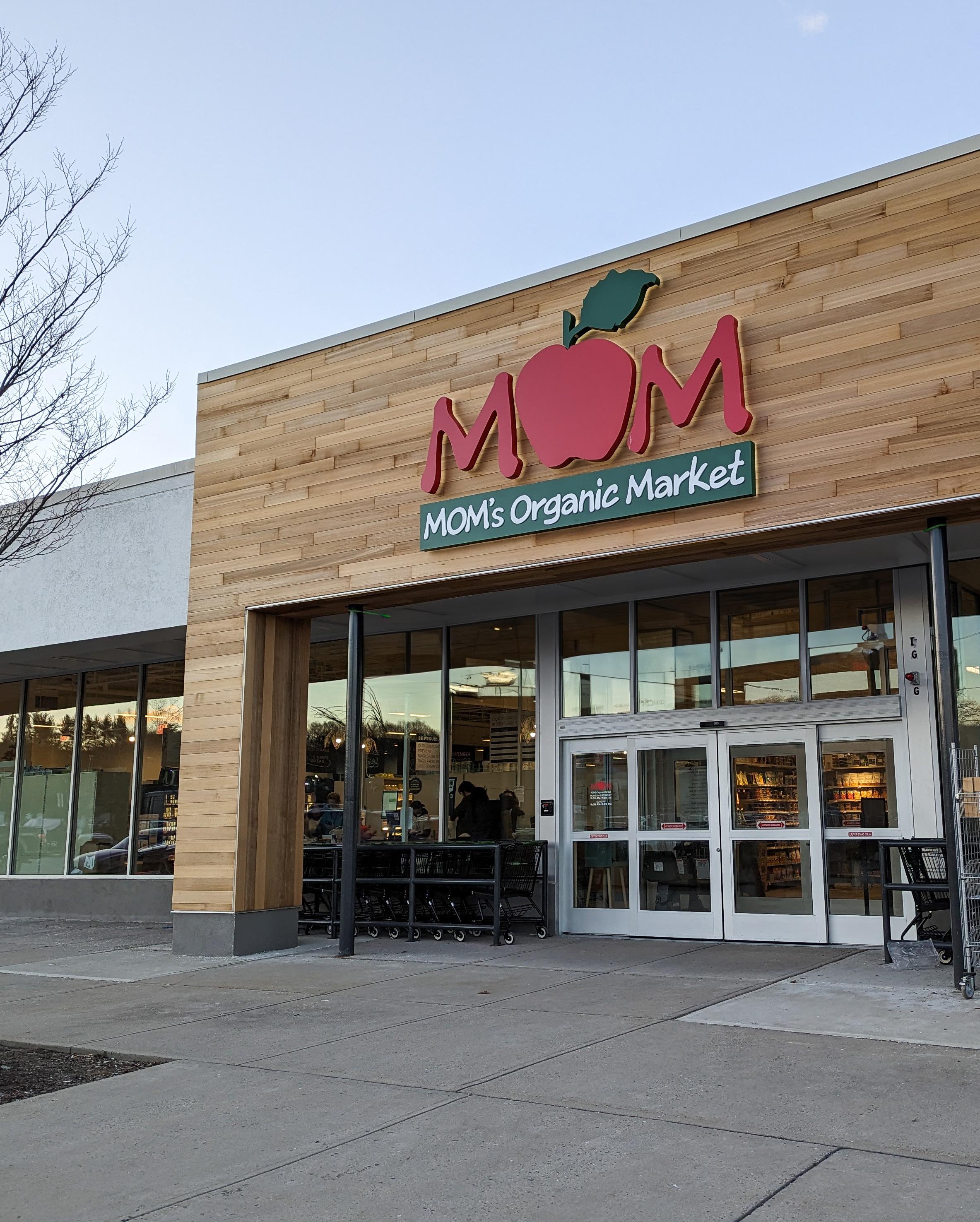
MOM’s Organic Market
In the Northeastern United States, MOM’s Organic Market sets the pace for purposedriven grocery shopping. Here’s what they had to say about their sustainability commitments:
Sales 52

“MOM’s Organic Market’s Purpose is to protect and restore the environment. To help MOM’s customers and employees live our Purpose we provide recycling for shoes, batteries, denim, corks, cell phones, and tablets at every store. In 2005, MOM’s eliminated plastic bags and in 2010 we banned bottled still water, replacing it with water machines and reusable water containers. Additionally, MOM’s works to mitigate our energy usage through rooftop solar, MOM’s Solar Farm, and purchasing wind power to offset our stores’ energy usage for all of our locations.
At MOM’s we take pride in what we offer, and even more in what we don’t. We have banned over 250 ingredients from our stores. In addition to clean ingredient standards, we are the only grocery store in the US to offer 100% sustainably sourced seafood, right down to the canned tuna! Our produce department is 100% organic with daily deliveries providing the freshest produce for our customers and reducing food waste.
MOM’s recently launched our Climate Friendly Foods Campaign. This campaign aims to promote foods that have a minimal carbon emission footprint during their growth cycle.
By focusing on foods that have lower greenhouse gas emissions, conserve water, and preserve land, we’re taking proactive steps to combat climate change and foster biodiversity through awareness. Through this campaign, MOM’s encourages customers to embrace organic options and explore alternative food choices, thereby minimizing their carbon footprint and making a positive impact on our planet.”


53
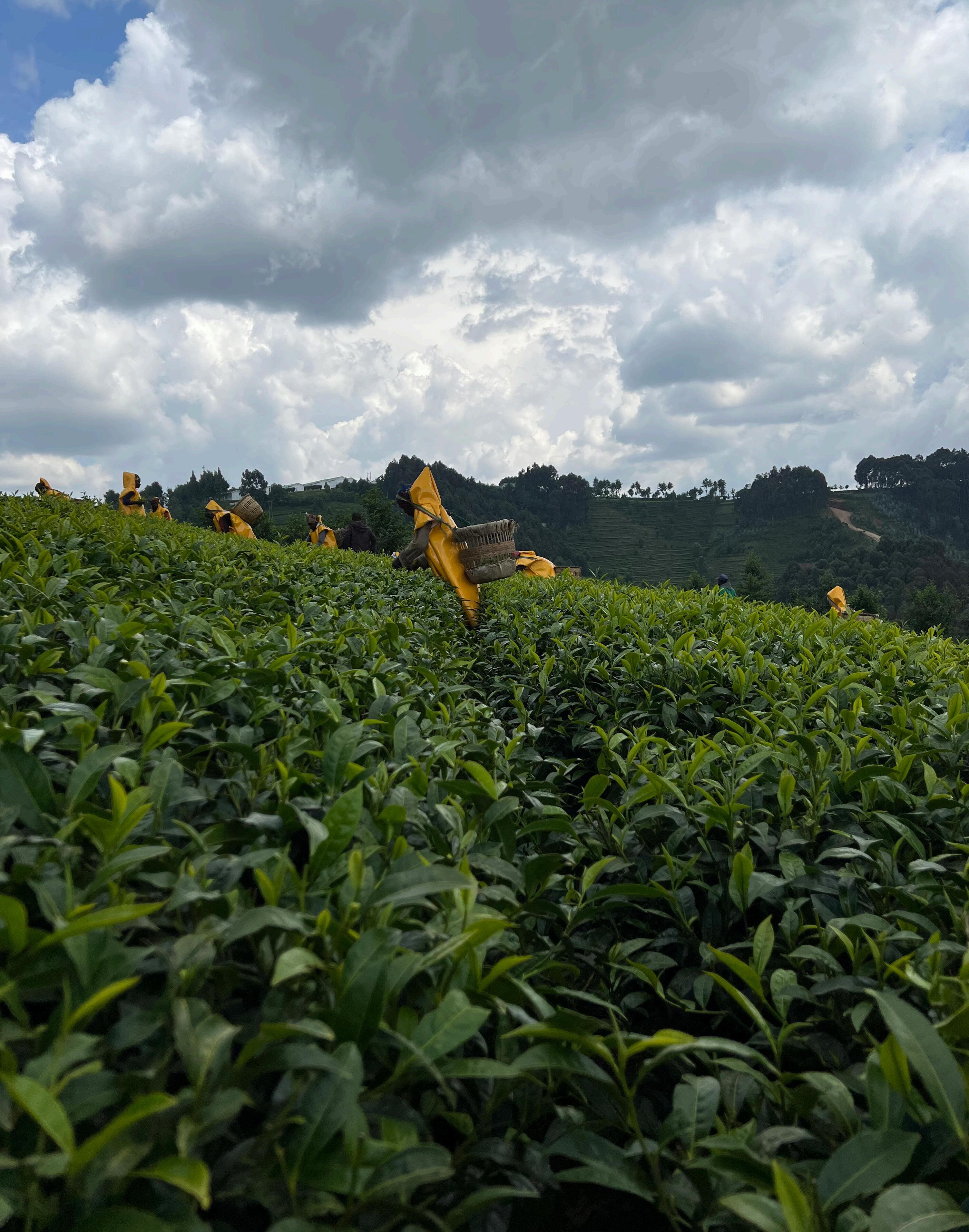
The Yogi Foundation
Closing the loop
The Yogi Foundation 54
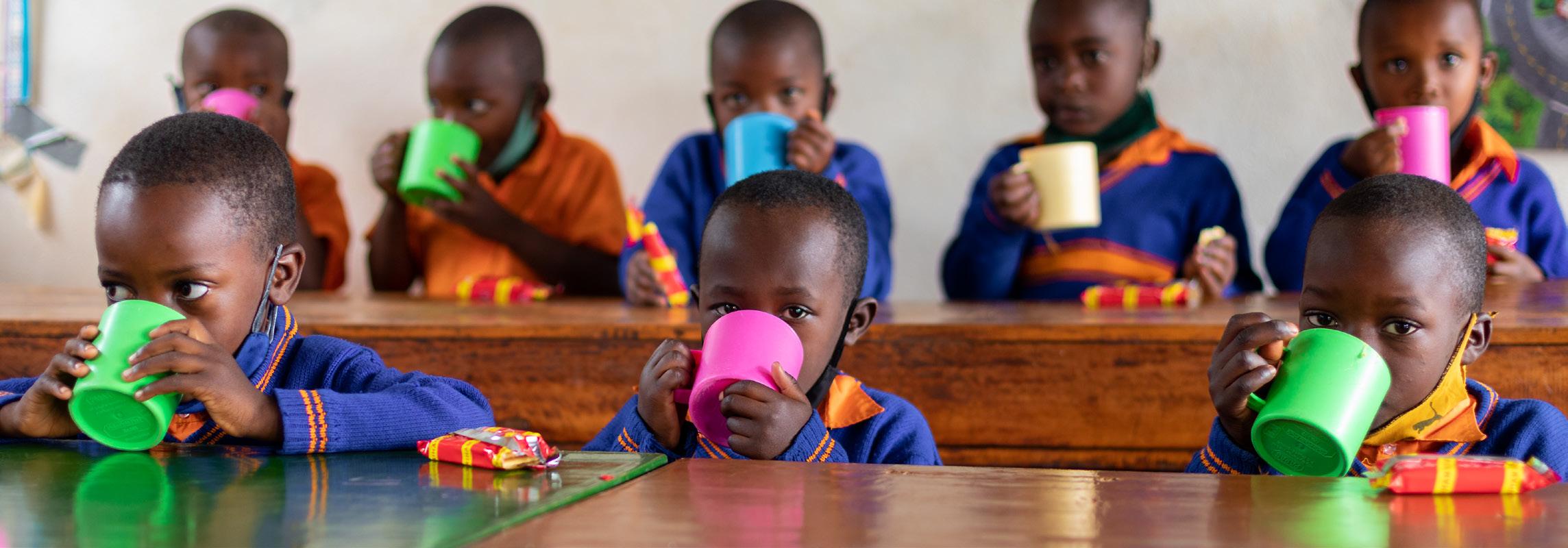
You might think that our tea journey would be at its end once our tea is in retailers’ hands. But for us, our sustainability journey isn’t a straight line with a beginning and end. It’s a circle: a virtuous cycle that builds as we grow.
The Yogi Foundation connects the end of our teas’ journey back to the start. It’d be easy to think that with an empty mug, recycled packaging, and composted ingredients our tea story would reach its natural conclusion. But each mug of tea creates some extra stuff that’s very useful: profit. The Yogi Foundation allows us to reinvest a portion of our profits back into worthy causes worldwide. Sometimes these causes are in our supply chain, and sometimes they’re organizations that simply need our support.
After all, we want to make a difference in a way that goes beyond our normal business operations. Engaging with our local communities, charitable giving, supporting global impact – all kinds of doors are open through the Foundation.
Moreover, the Foundation is a resource for experts throughout our organization to find support for their ideas. We will never, for example, know farmers’ needs as much as they do. If one of our buyers is made aware of a need on a farm, the Foundation can step in and provide funding to improve quality of life, quality of product, climate resiliency, or any other goal that aligns with our mission.
Above all, the Yogi Foundation exists to ensure the world is better off because we’re in it.

55
The Yogi Foundation’s 2023 funding
Impacting people and planet through projects that make a difference.

Maryland, US: Yoga for Youth Spreading the lifegiving practice of yoga to disadvantaged youth populations.
Sustainable Practices in Cardamom Farming with Nelixia
Helping modernize cardamom production by promoting agroforestry, reducing dependence on firewood for drying, improving infrastructure, reducing carbon emissions and preventing deforestation.
Guatemala: Regenerative Agriculture and Community Empowerment
Assisting cardamom farmers with infrastructure development and agronomic improvement.
South Africa: Cape Natural Kit the Kids Project
Providing school materials to disadvantaged schoolchildren in rooibos-producing areas of South Africa.
56
The Yogi Foundation

Rwanda: Sorwathe Lemongrass Diversification and Cow Donation
Aiding in the implementation of regenerative agricultural practices by supporting lemongrass cultivation on tea plantations, including the donation of 25 cows to assist in composting.
Germany: Bee Happy Cooperation with German Wildlife Foundation
Protecting wildlife and biodiversity in tandem with our Bee Happy Tea.
Nepal: Kumari Safe House
Providing sanctuary and care for youth, along with arts education and future planning.
Nepal: Promoting Food Security with Martin Bauer
Supporting ginger farmers in the Nepalese highlands with crop diversity and agronomic training.
Telandana, India: Leilani House and Childrens’ Home
Providing a safe space for young Indian girls to live and attend school.
Sri Lanka: Cinnamon Waste Compost Development with Verger
Upcycling cinnamon oil production waste into organic fertilizer for farm and community development.
Kenya: Odhiambo Nicholas Ochieng Scholarship with Browns Botanicals
Providing educational aid to promising youth in tea producing areas of Kenya.
Rwanda: Porridge Project
Partnering with a supplier to provide nutritionally fortified porridge to farmers’ school-age children.
57

The Yogi Foundation in action
The Yogi Foundation 58
Sri Lanka is an amazing place to source spices. The cinnamon, clove, pepper, nutmeg, and mace we get from the island is second to none! In 2022, the government suddenly imposed a ban on chemical fertilizers that caught conventional farmers off guard. Even though we only source organically, the community needed help: with conventional farmers suddenly demanding organic fertilizer, even longstanding organic farmers couldn’t get the material they needed. Our supplier, Verger, stepped up, and the Yogi Foundation provided funding to support.
“Necessity is the mother of invention,” as the saying goes, and in a time of need it was time to reevaluate the tools we had at hand. We use a great deal of cinnamon oil in our teas; it delivers flavor and function more robustly than the powdered stuff you might have in your cupboard. But producing cinnamon oil creates quite a bit of leftover cinnamon bark after its oil has been extracted. Fortunately, however, our collaboration with Verger turned trash into treasure.
Yogi Foundation funding supported the creation of a compost program that turned used cinnamon bark into organic fertilizer in the form of compost. Since the organic fertilizer shortage is being felt across Sri Lanka, Verger is distributing the compost to farmers at a concessionary rate, ensuring the health of the greater farming community and assisting in the transition to organic, sustainable farming techniques.
This is the first time cinnamon bark waste has been used as a compost source at scale and we’re hoping the idea catches on! The first distributions of compost went out in late 2023 at the rate of about 15 tons per month. It’s an extraordinary amount of a precious resource, all coming from what used to be considered garbage. The success of this program inspired us, and Verger, to sign a commitment to a full-blown regenerative agriculture project beginning later in 2024.
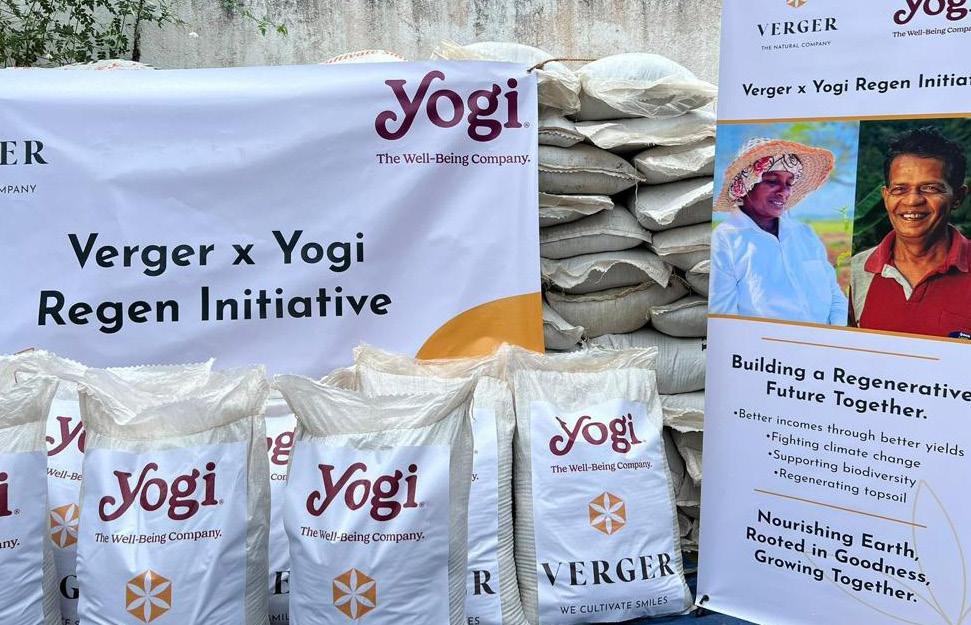
As is the case with all sustainability work, the effects of farming challenges – climate change, soil degradation, etc. – are never local. They’re global, experienced by everyone, so solutions need to be equally as collaborative. We’re happy to be involved with an initiative that breathes new life into an entire agricultural region. Promoting regenerative practices among our suppliers alone will never be sufficient to solve the sustainability problems the tea industry is facing. We need community-scale, collaborative projects to create real change.
Crops benefited: cinnamon, pepper, clove, nutmeg, ginger, turmeric, vetiver, jasmine
654.46 acres of farmland, involving 198 farmers, benefited so far
Total beneficiaries: More than 1,500 people 60+ tons of organic compost converted from what would have been waste every quarter.
59

Looking ahead: Our journey continues
The Yogi Foundation 60
We’ve come far on our sustainability journey. And yet, whatever our accomplishments and accolades, we’re still pushing forward. Here’s what we’re prioritizing for the year ahead.
Packaging improvements
We’ve made great strides with our packaging, but there’s more to do. We will continue developing sustainable materials while building on the improvements we outlined in this report.
Carbon reductions
Carbon footprint reduction is the journey of a lifetime! Our carbon working groups will continue their efforts and we will continually evaluate decisions and strategies with carbon in mind.
Regenerative agriculture
Our commitment to regenerative practices is set to grow this year by launching some new projects as well as sustaining our existing commitments.
Living wage/living incomes
Attending to social and economic disparities at farm level is a priority for 2024. Look for new collaborations, data collection, and farm-level interventions, to inspire progress.
Pre-competitive partnerships
We believe sustainability supersedes competition. Our fellow tea companies are faced with the same challenges we are, and together we can get more done faster.
Storytelling
We want to bring you along on this journey, so keep your eyes open for more detailed storytelling from around the world to share our work with the global tea community.
Thank you for coming with us on this journey, and for supporting us through another year of sustainability work. Next year we’ll check back in on our progress against these goals and we hope you’ll join us!
Yours in tea,
The Yogi Sustainability team
61

Questions or comments? We’d love to hear from you at SustainabilityReport@EastWestTea.com
North America yogiproducts.com choiceorganicsproducts.com Europe yogitea.com choice-organic.com














































































